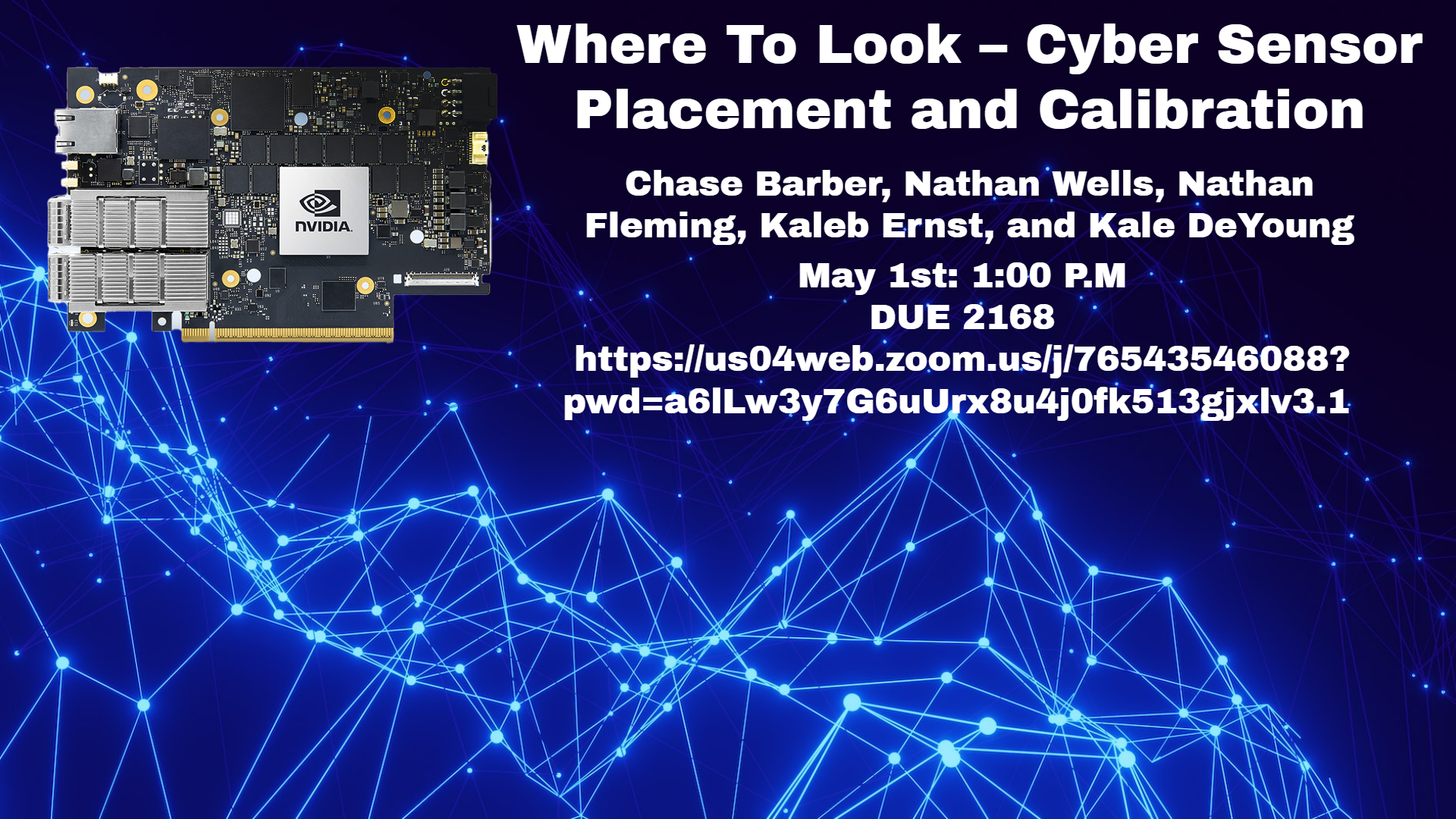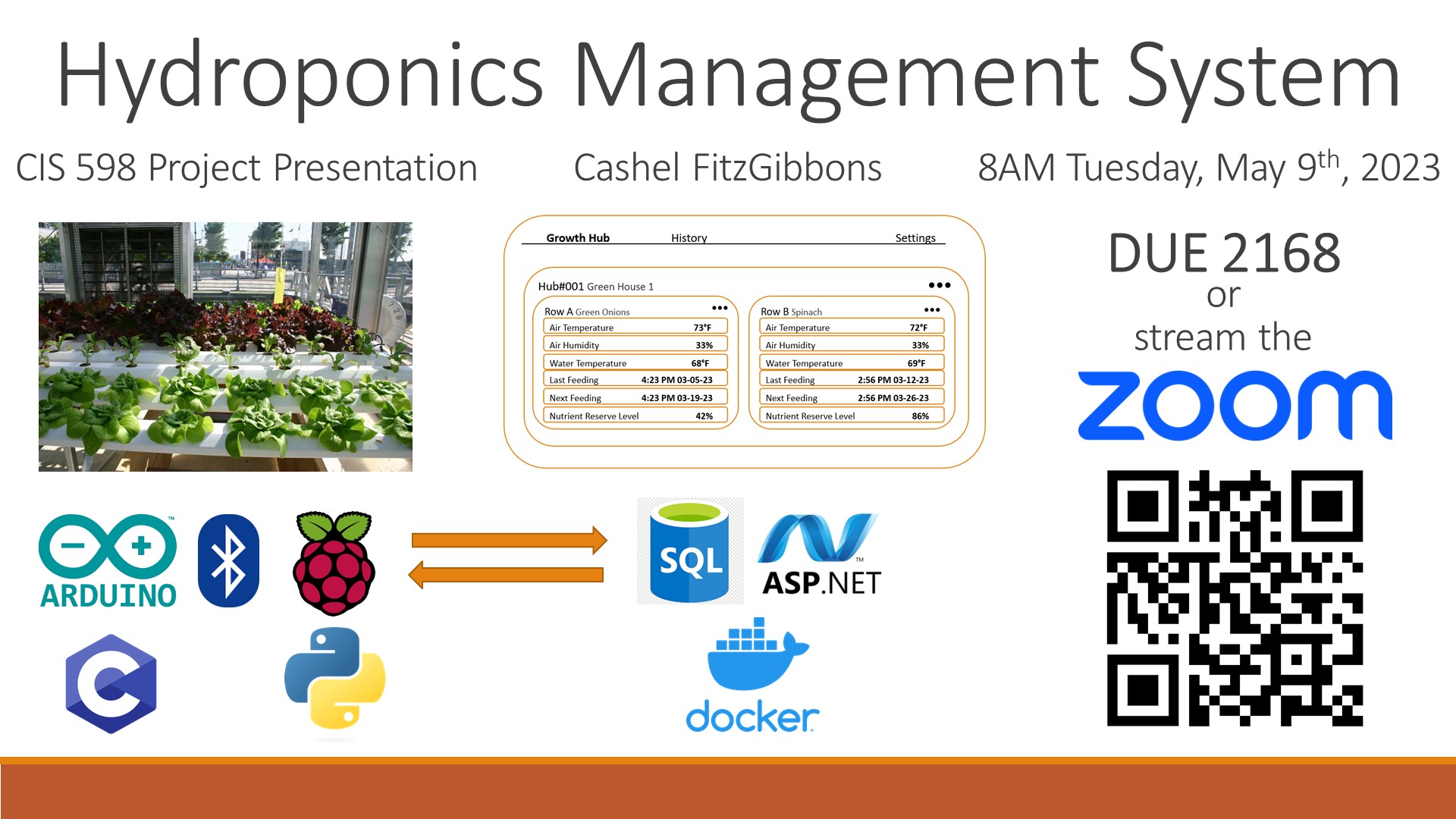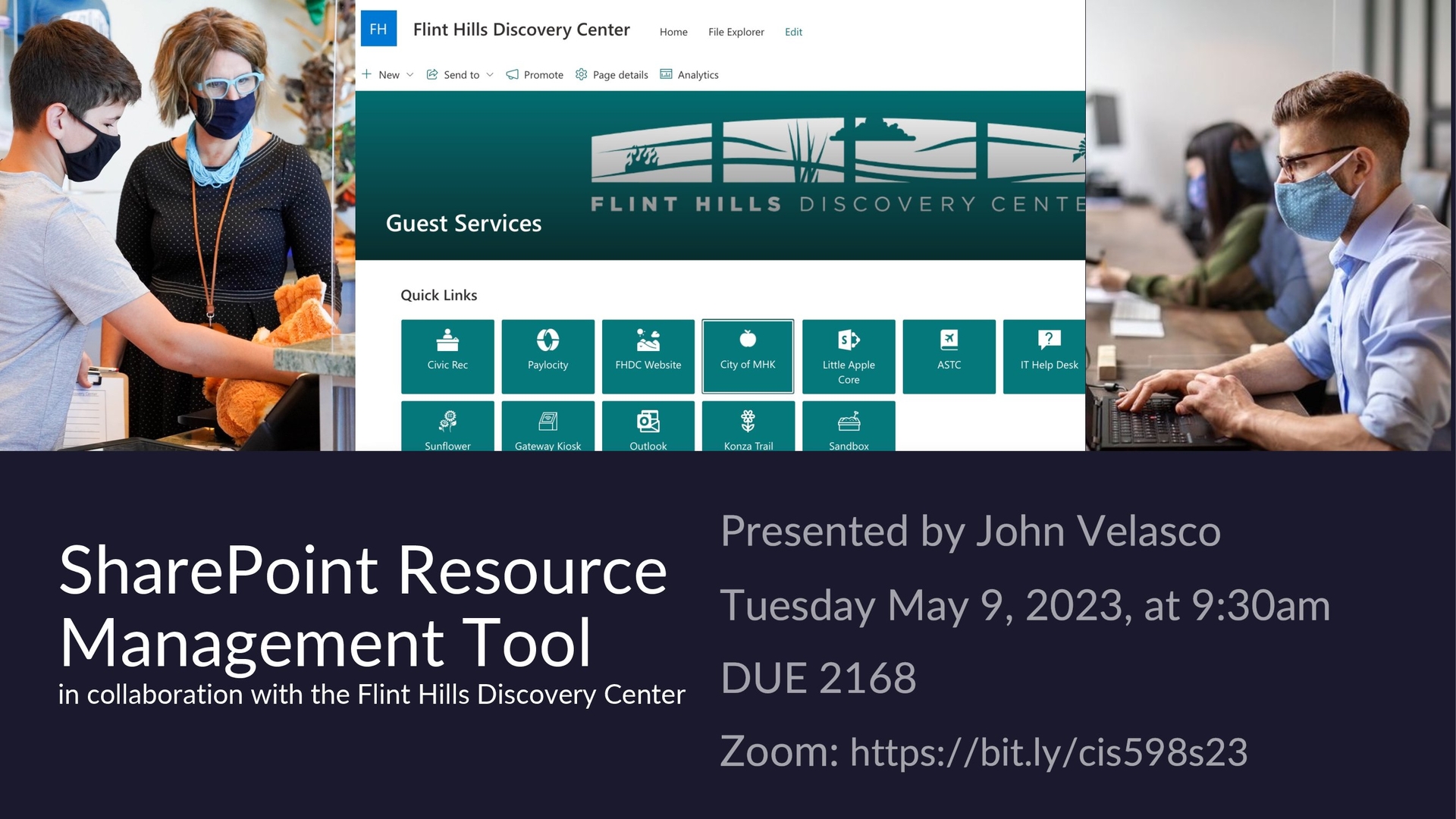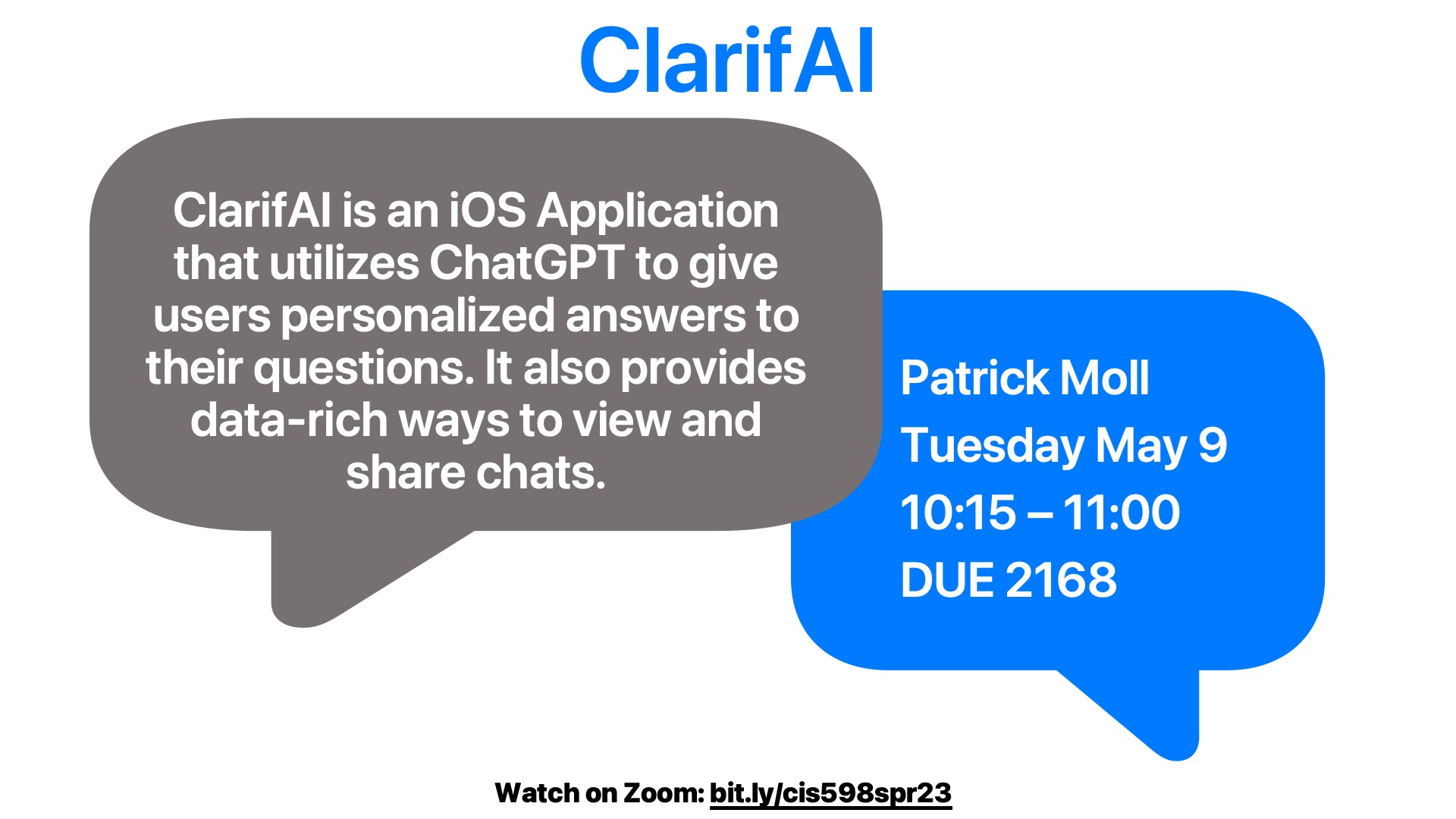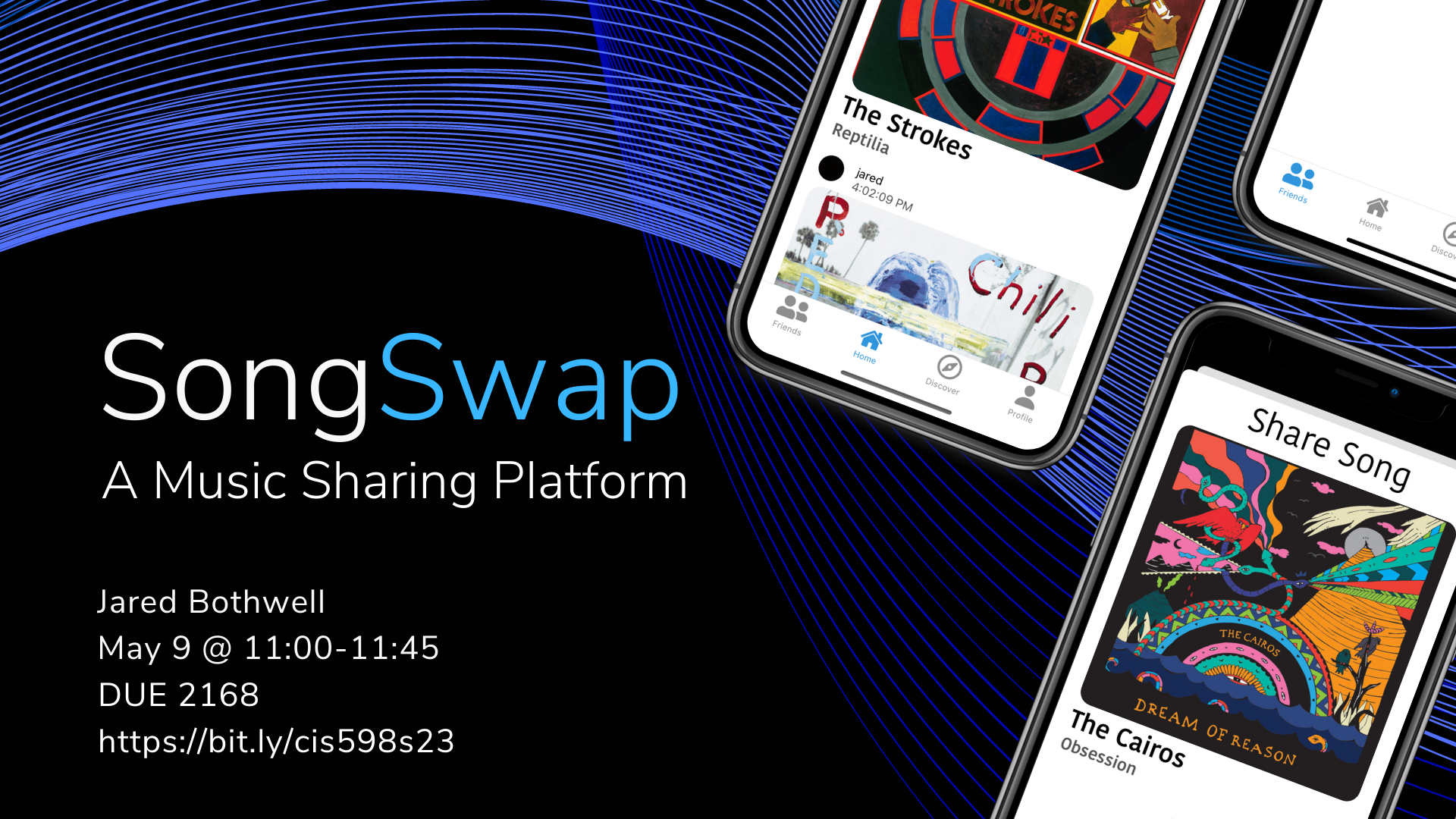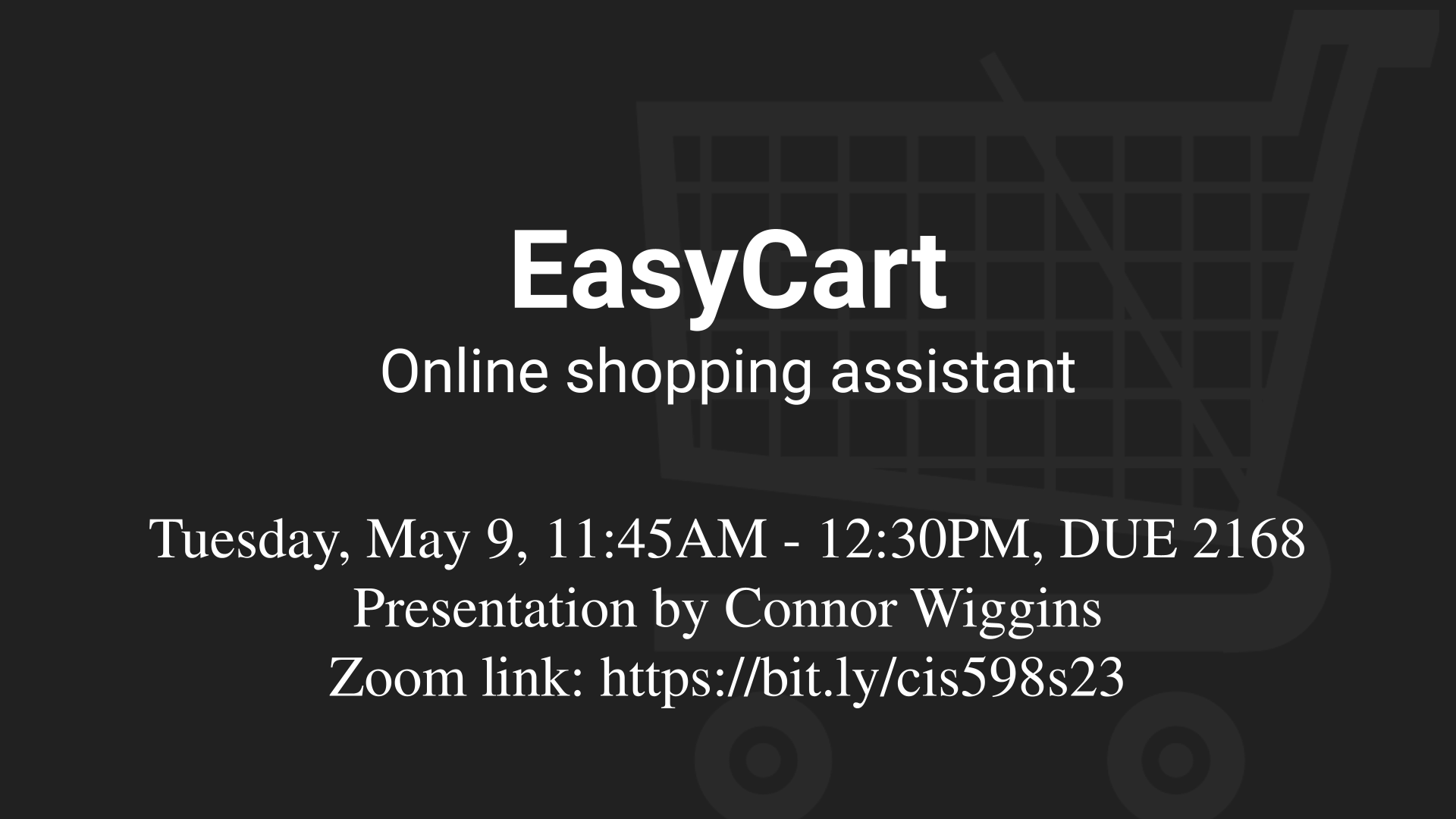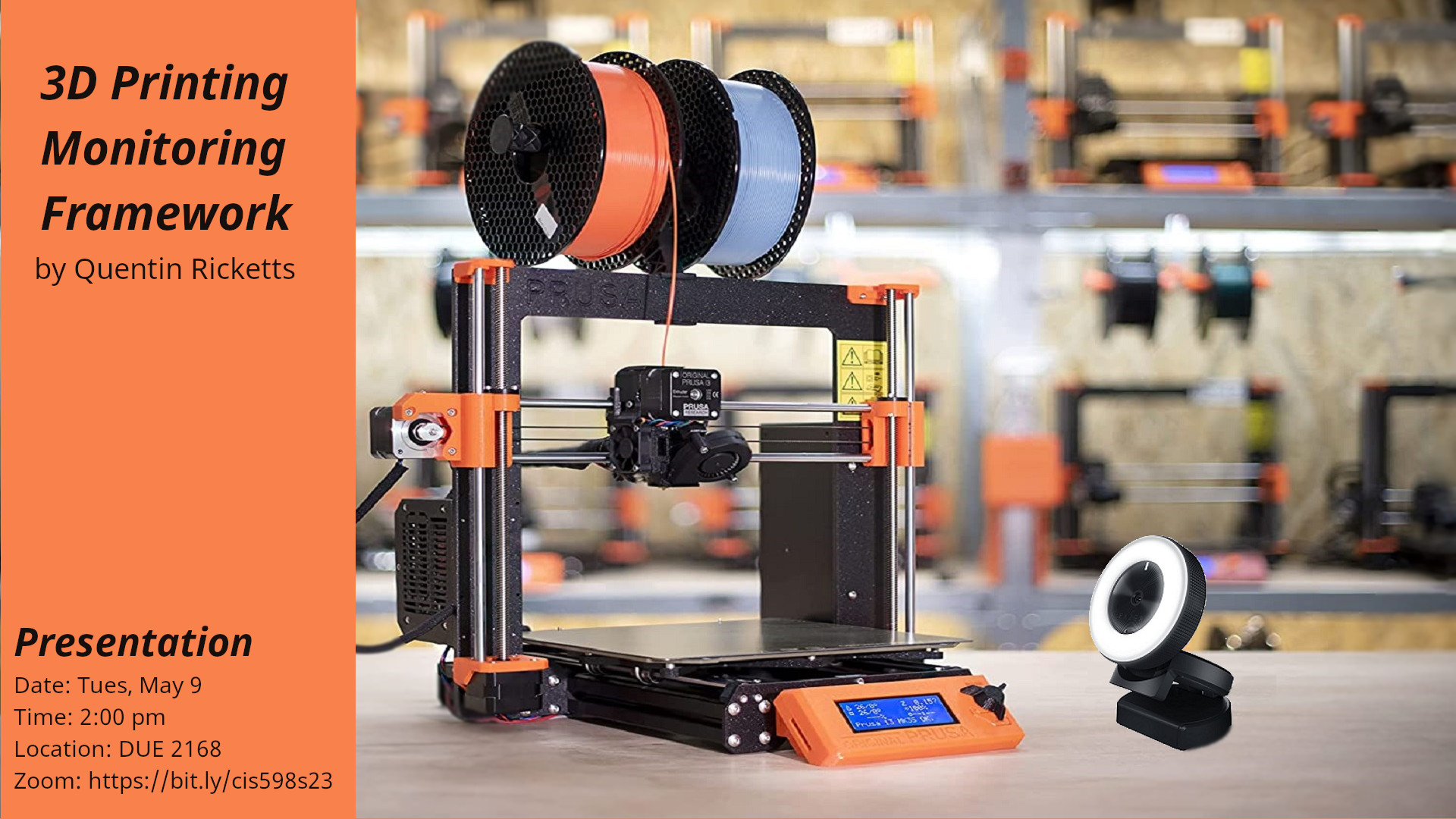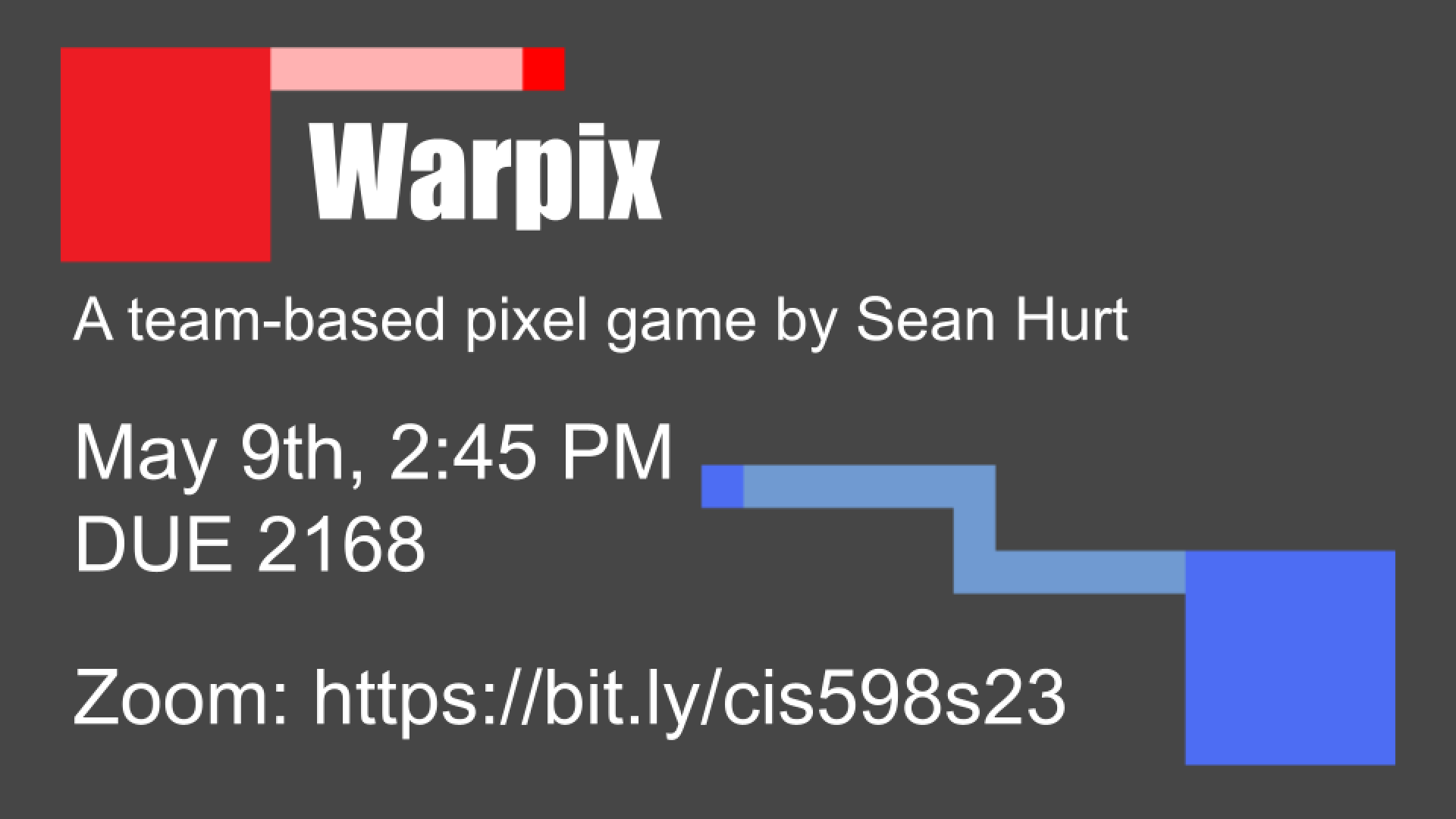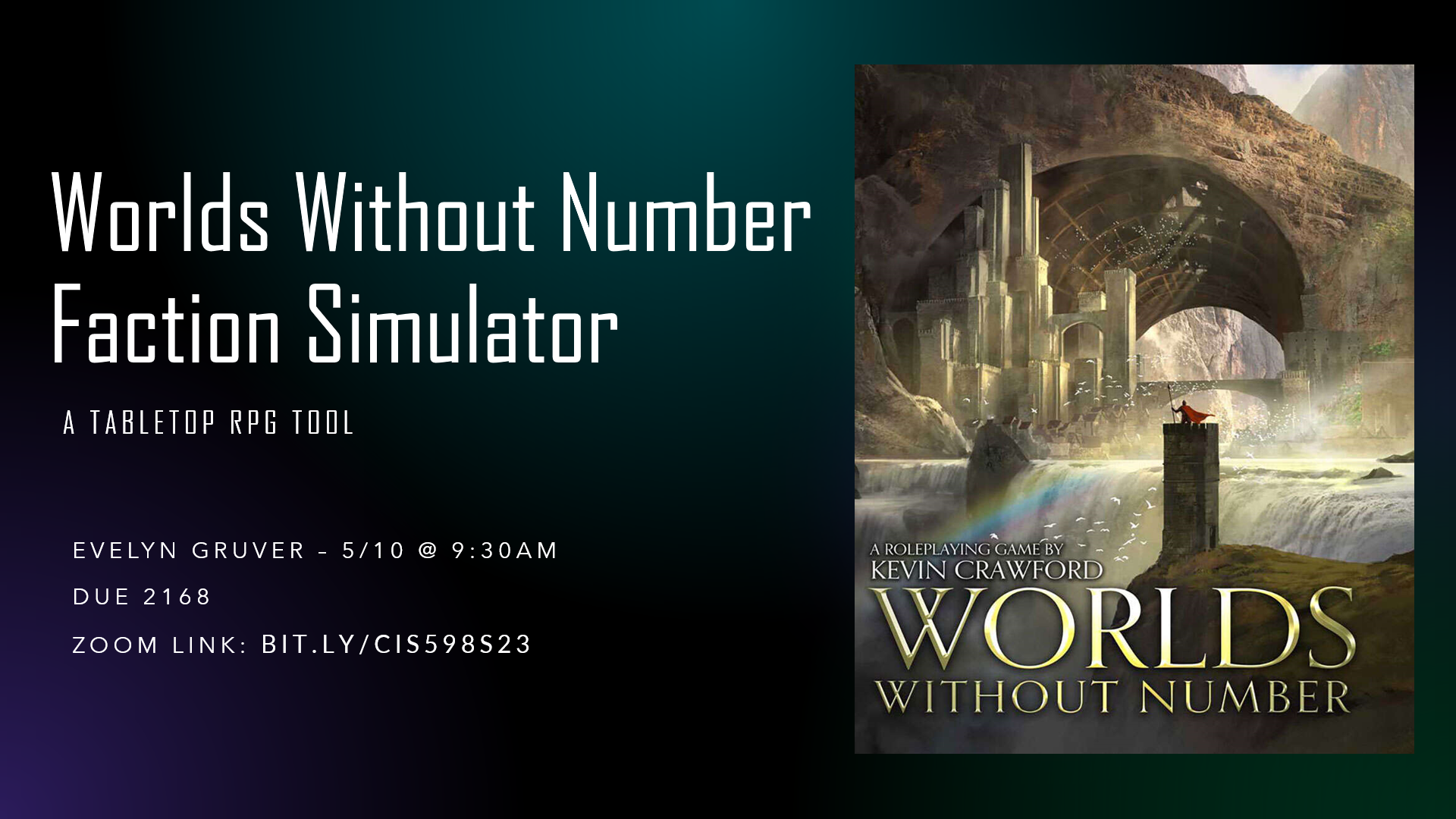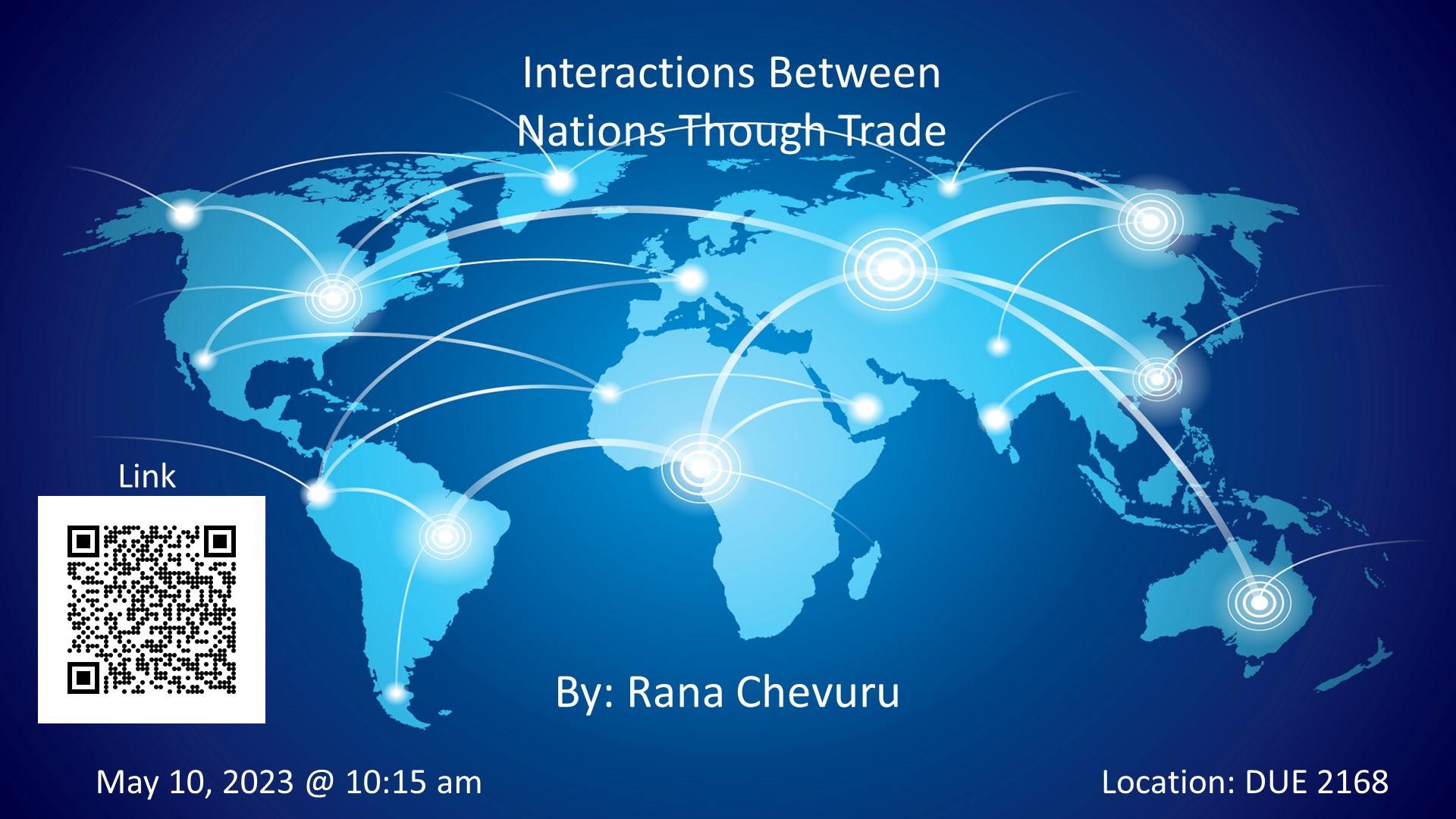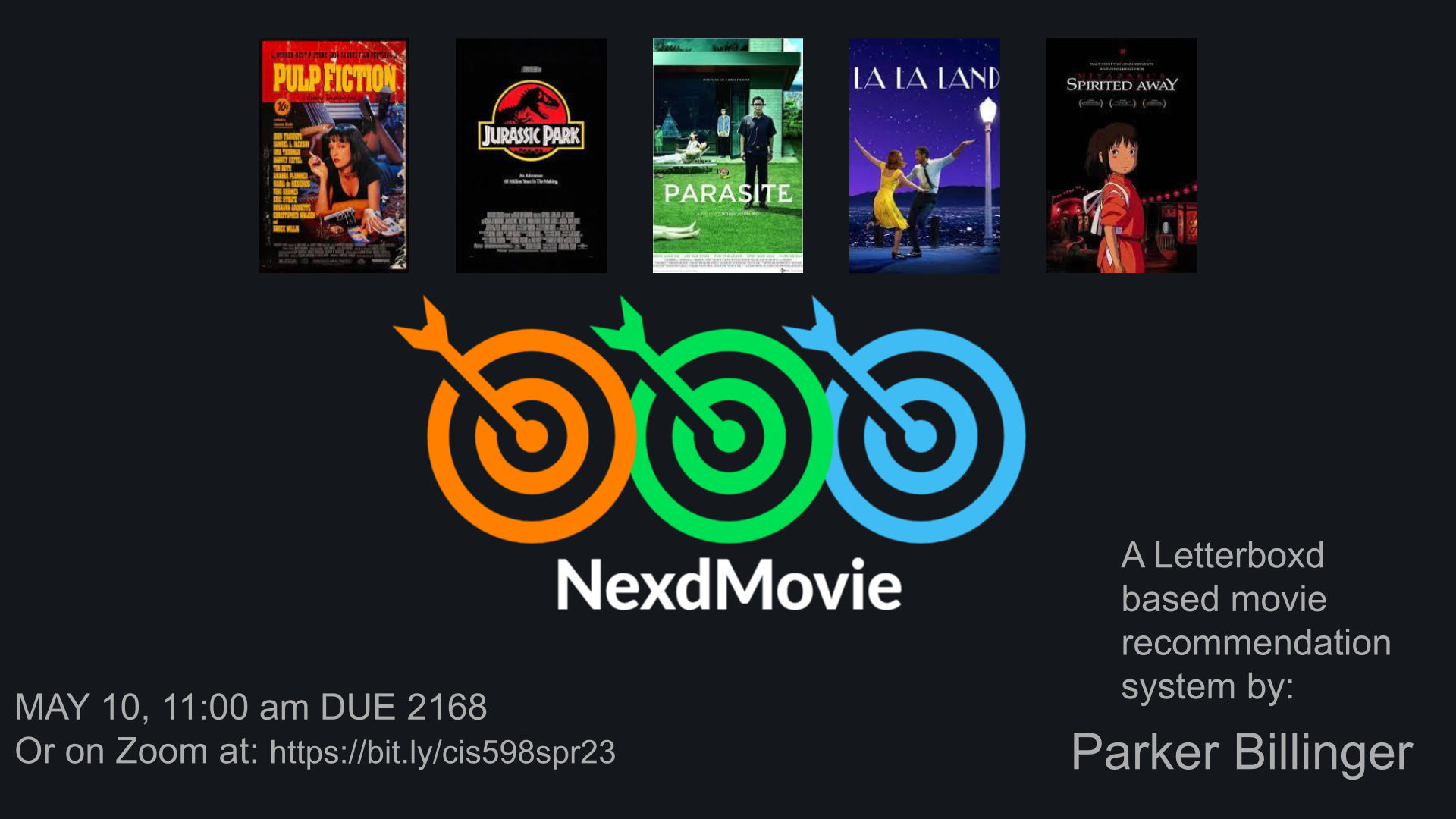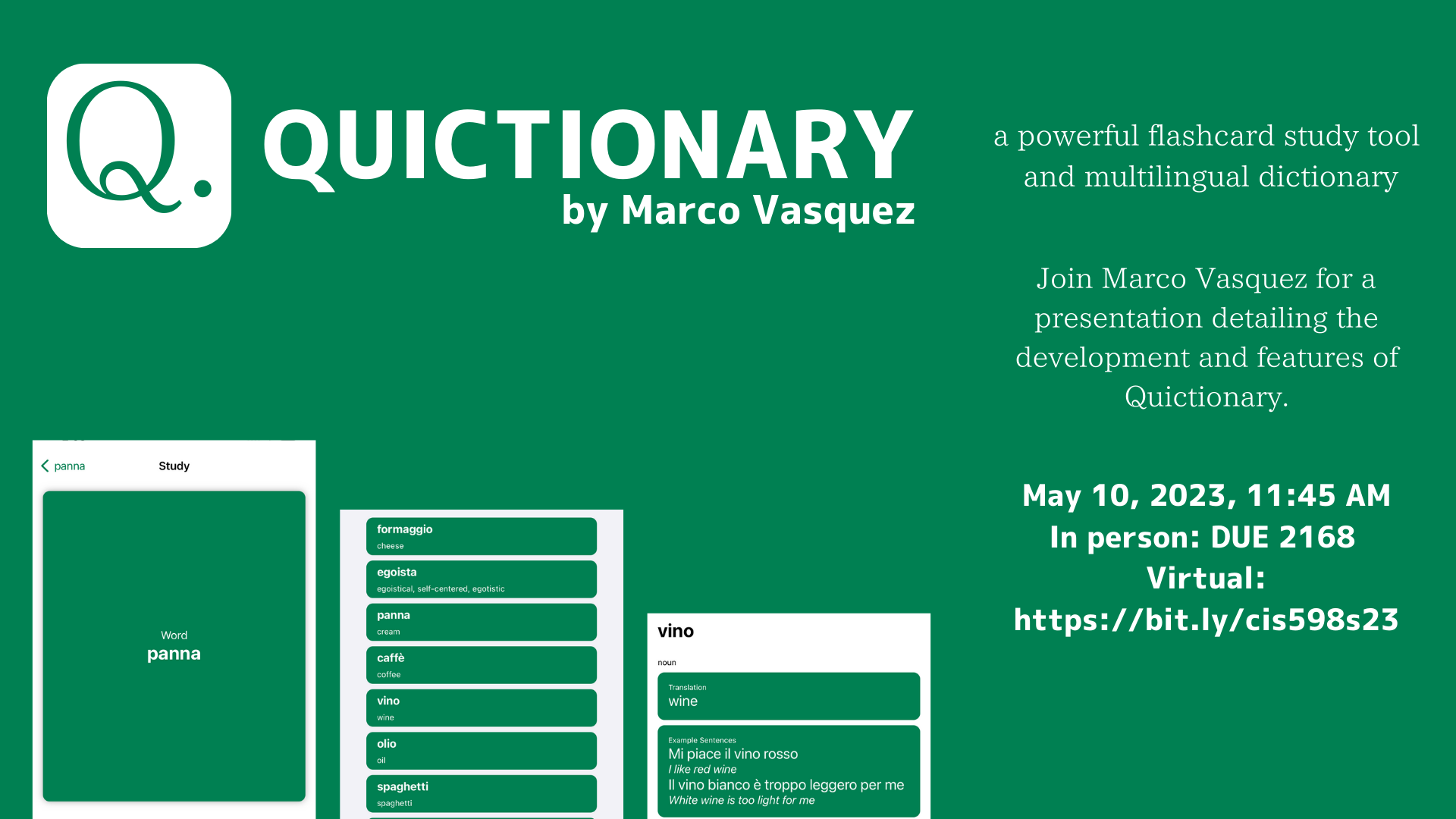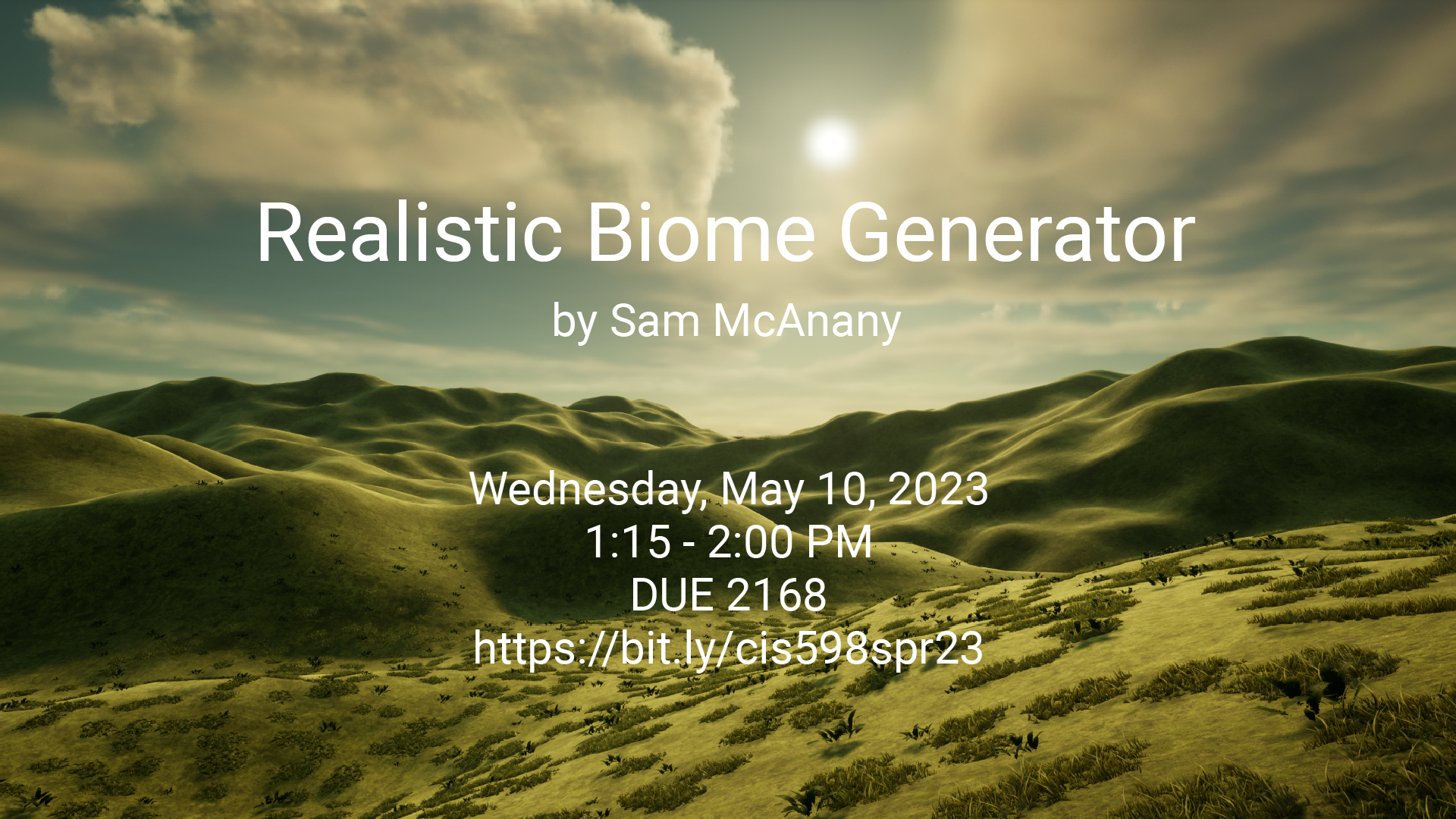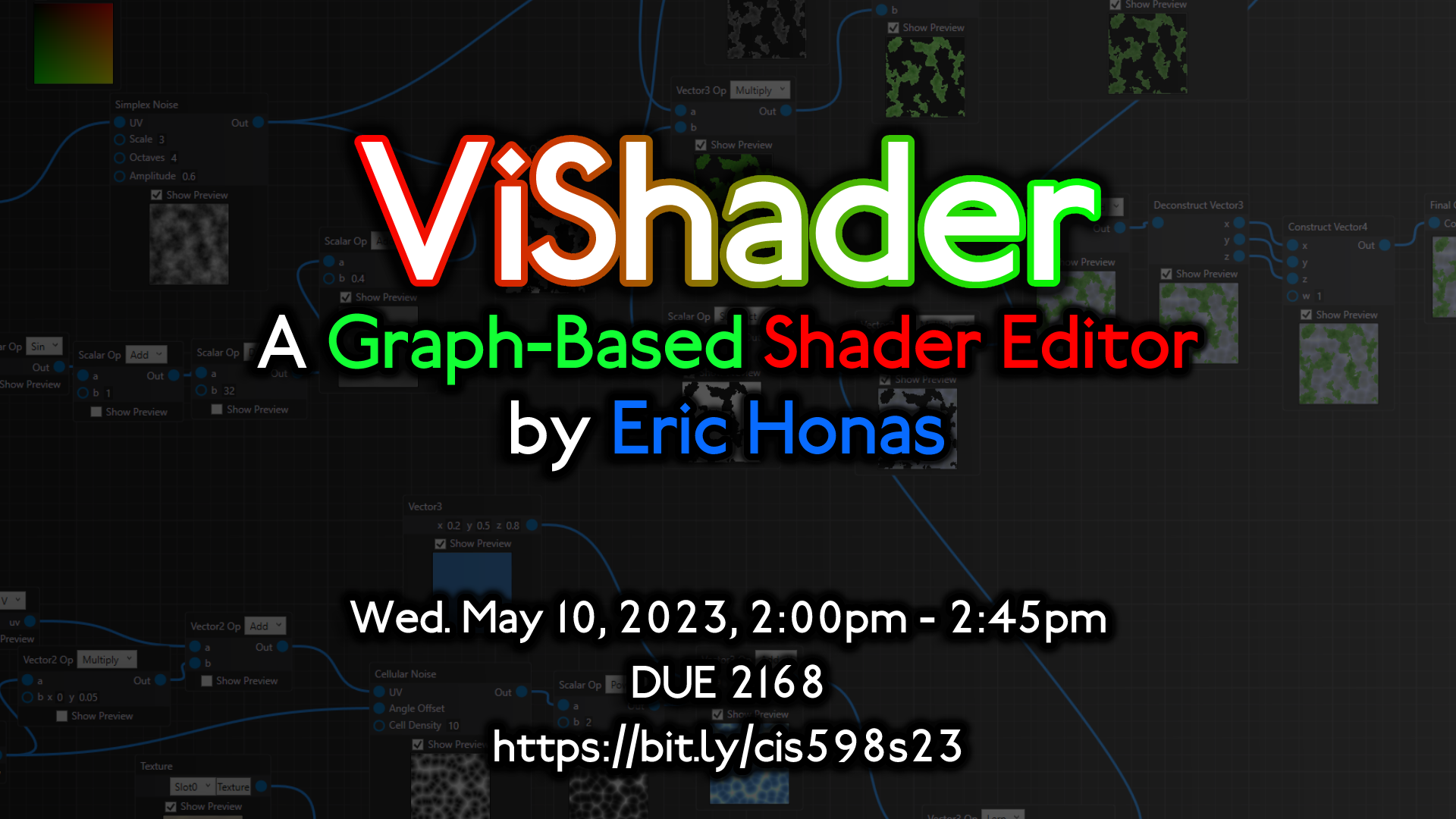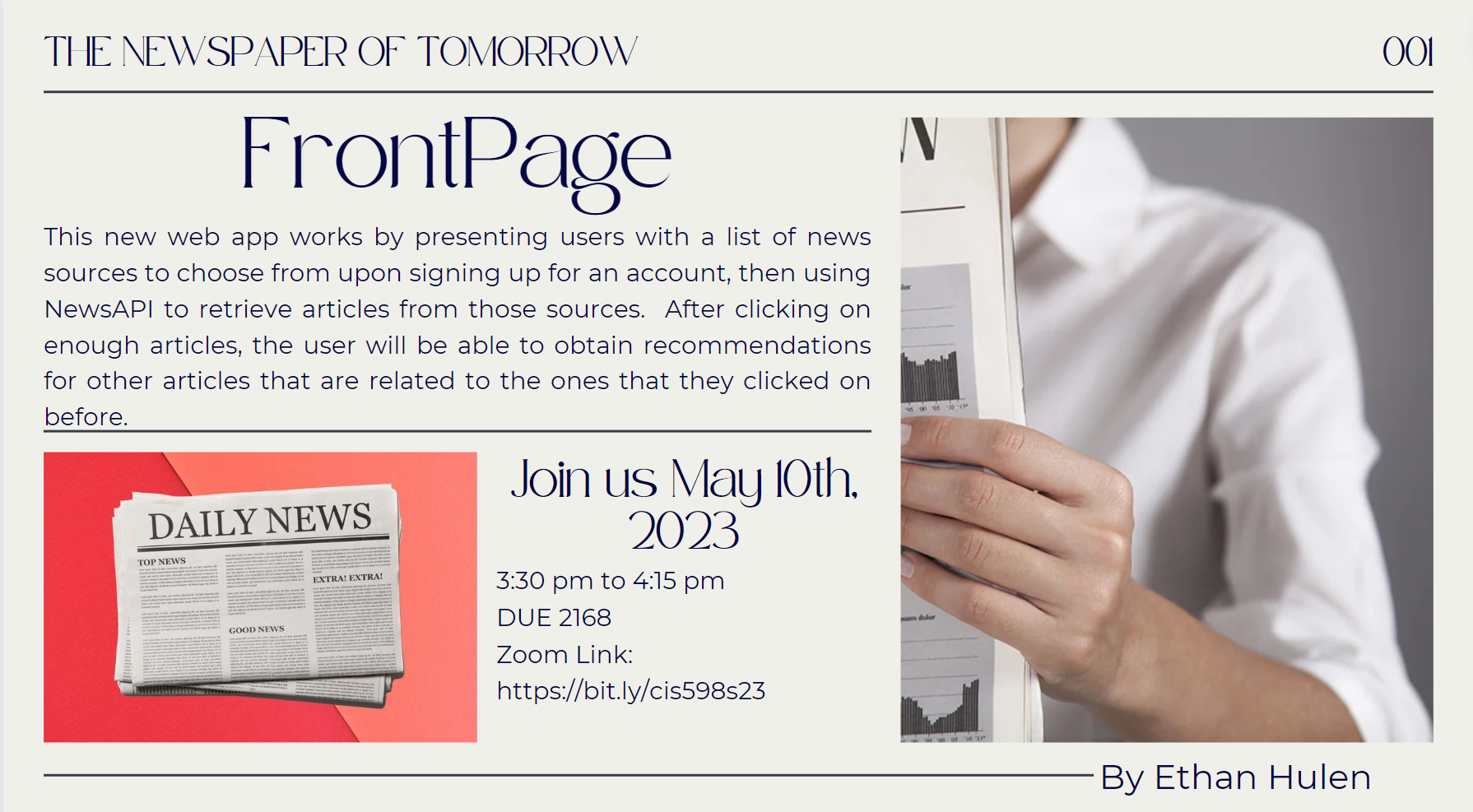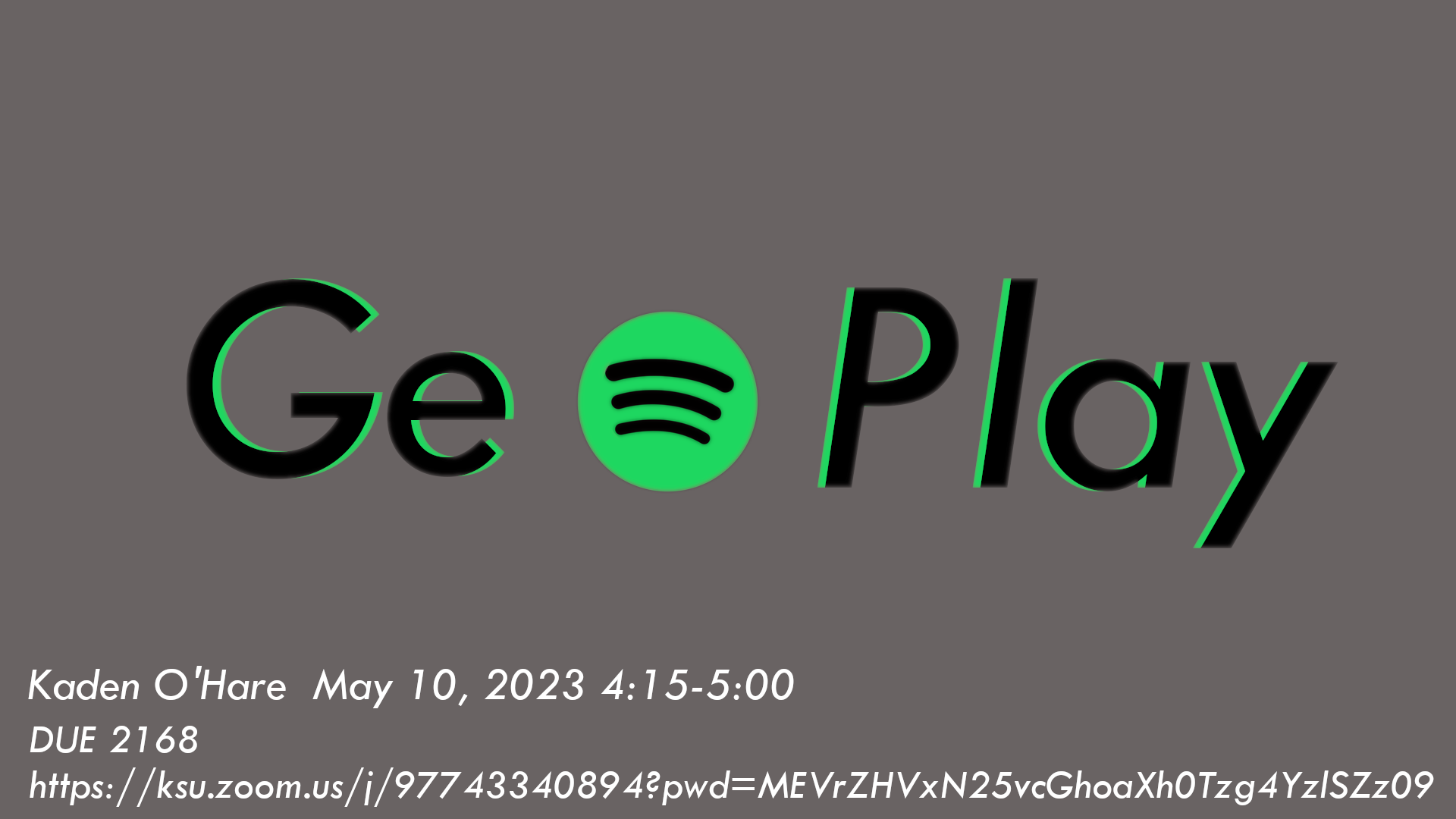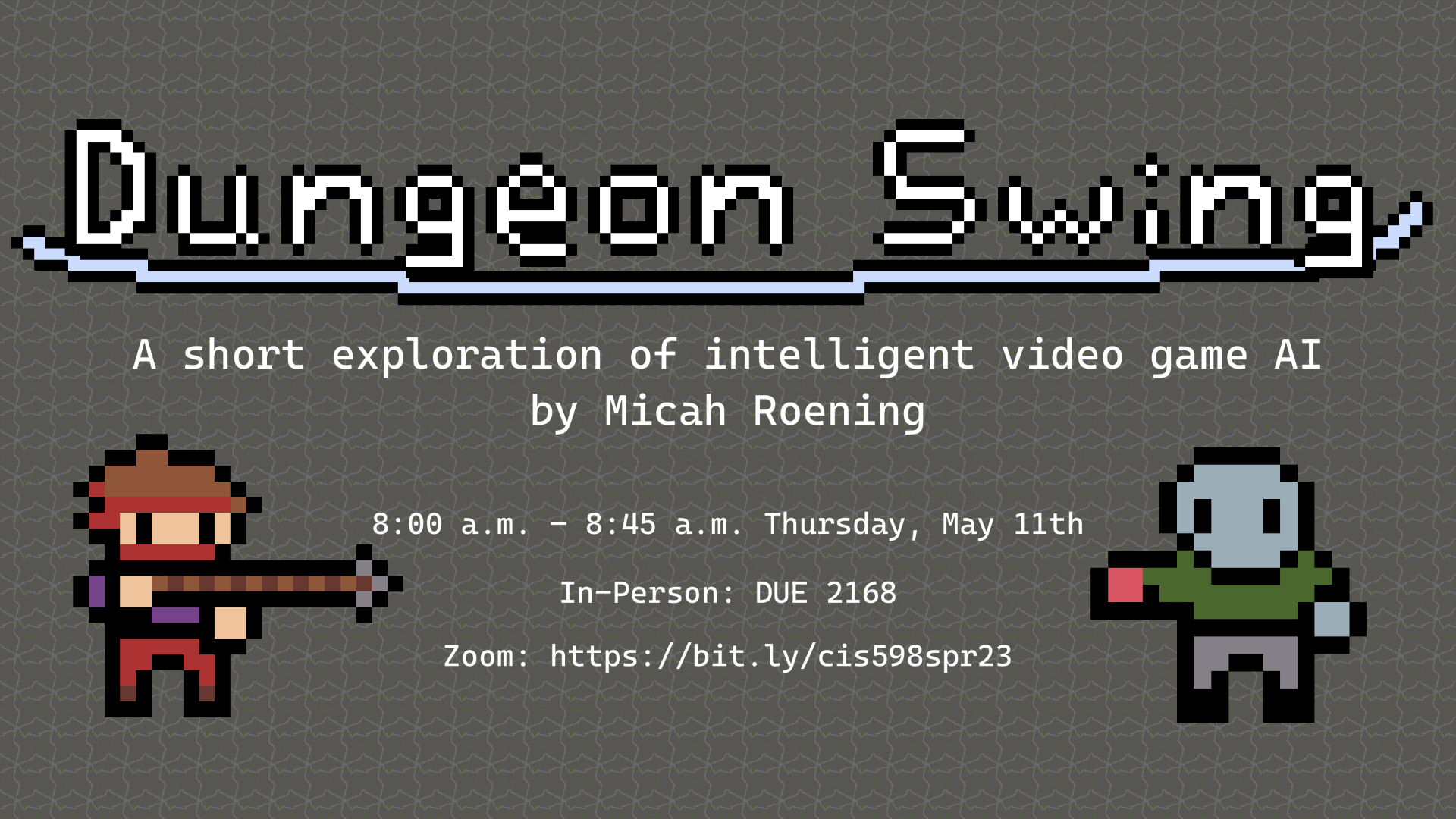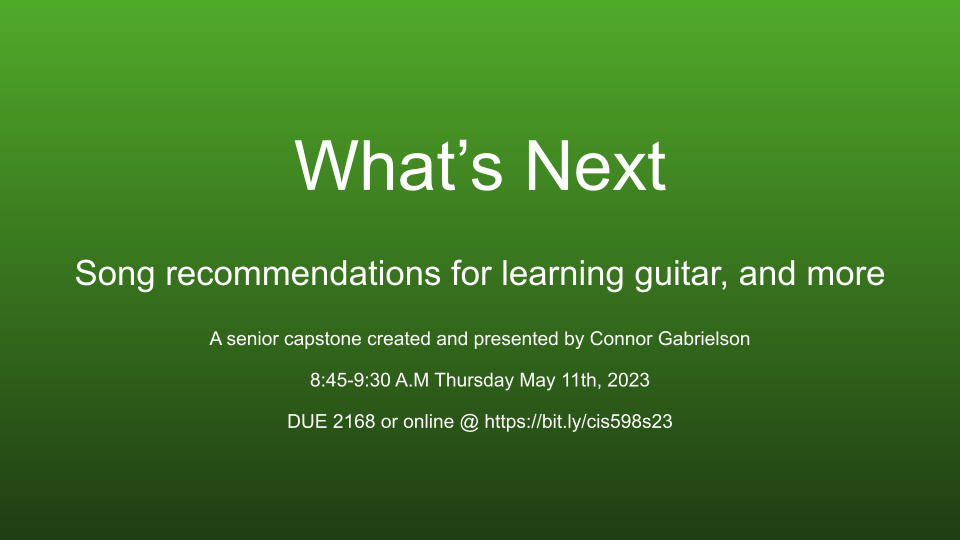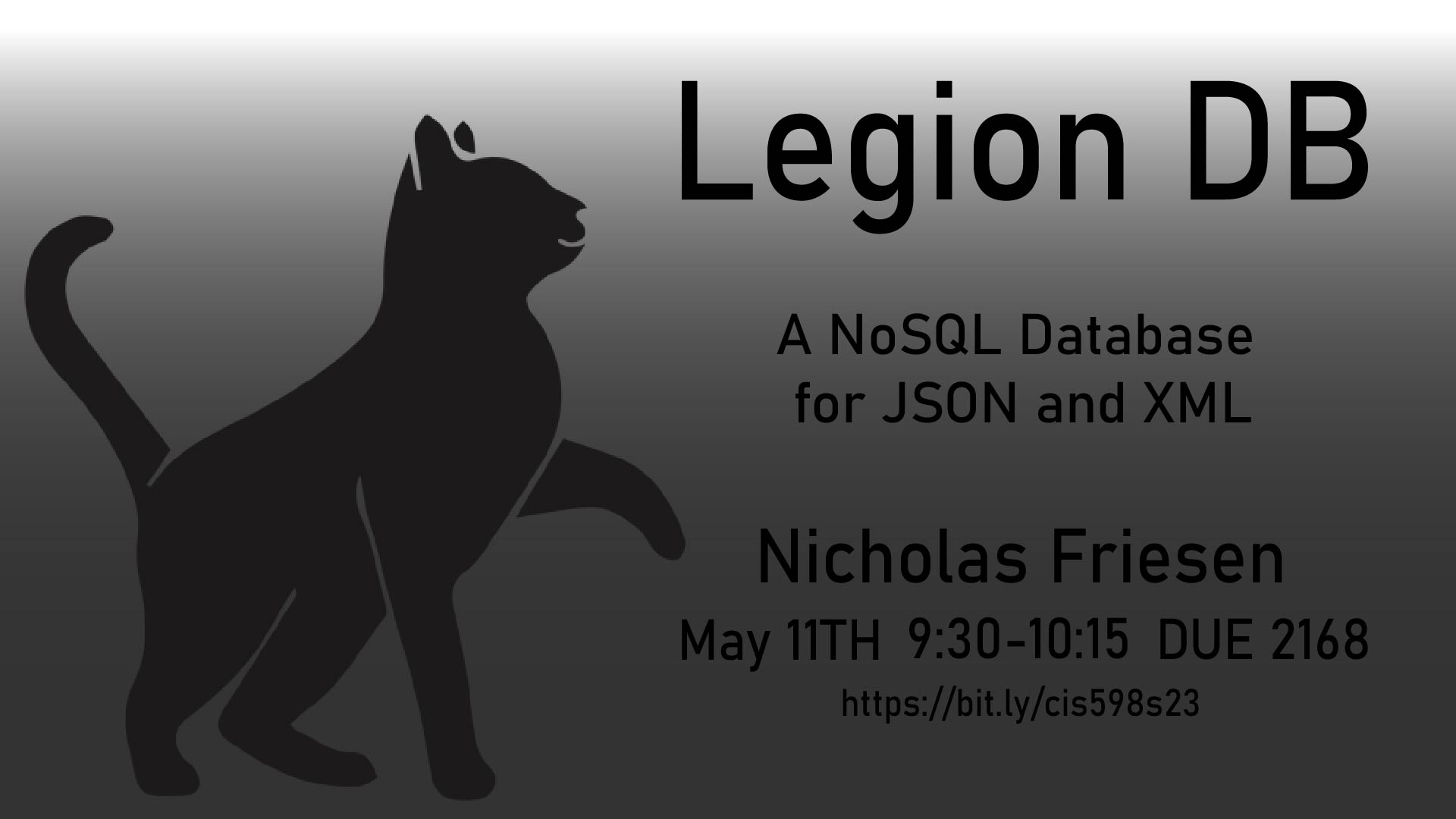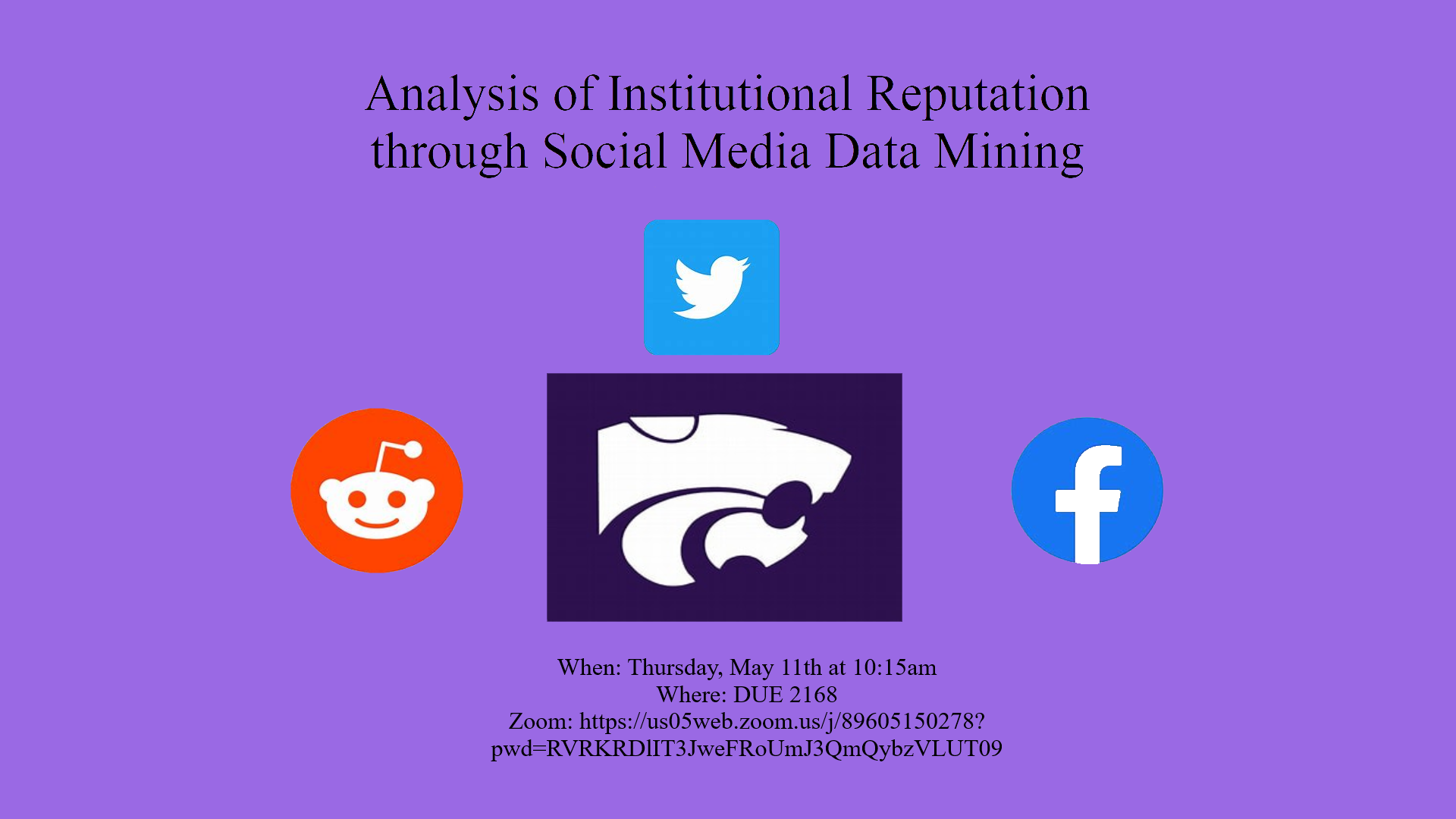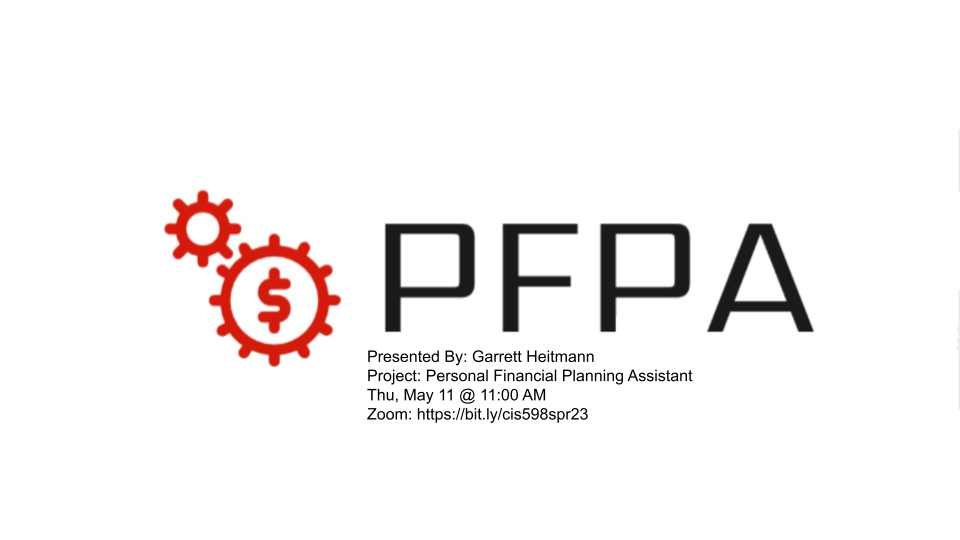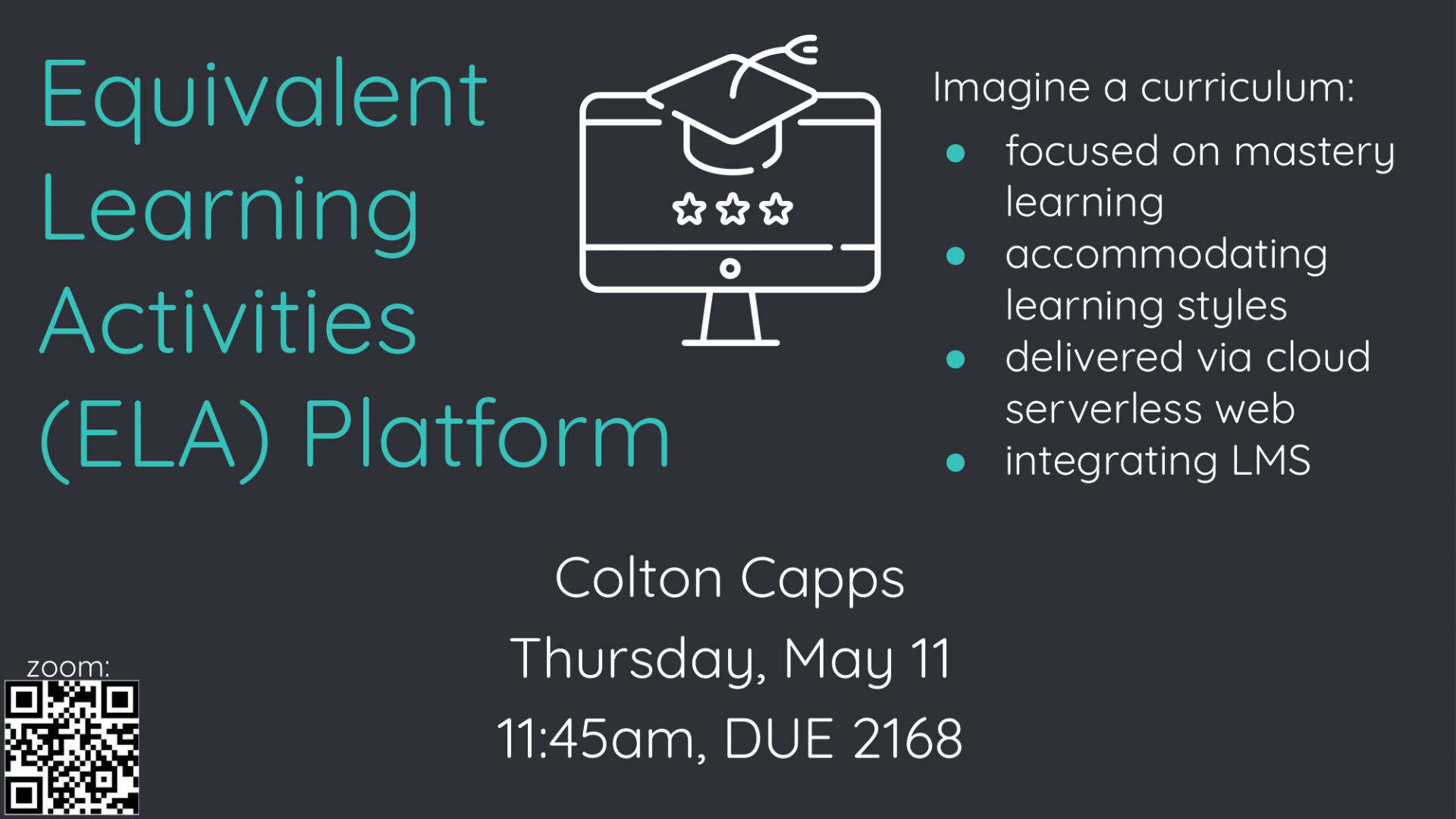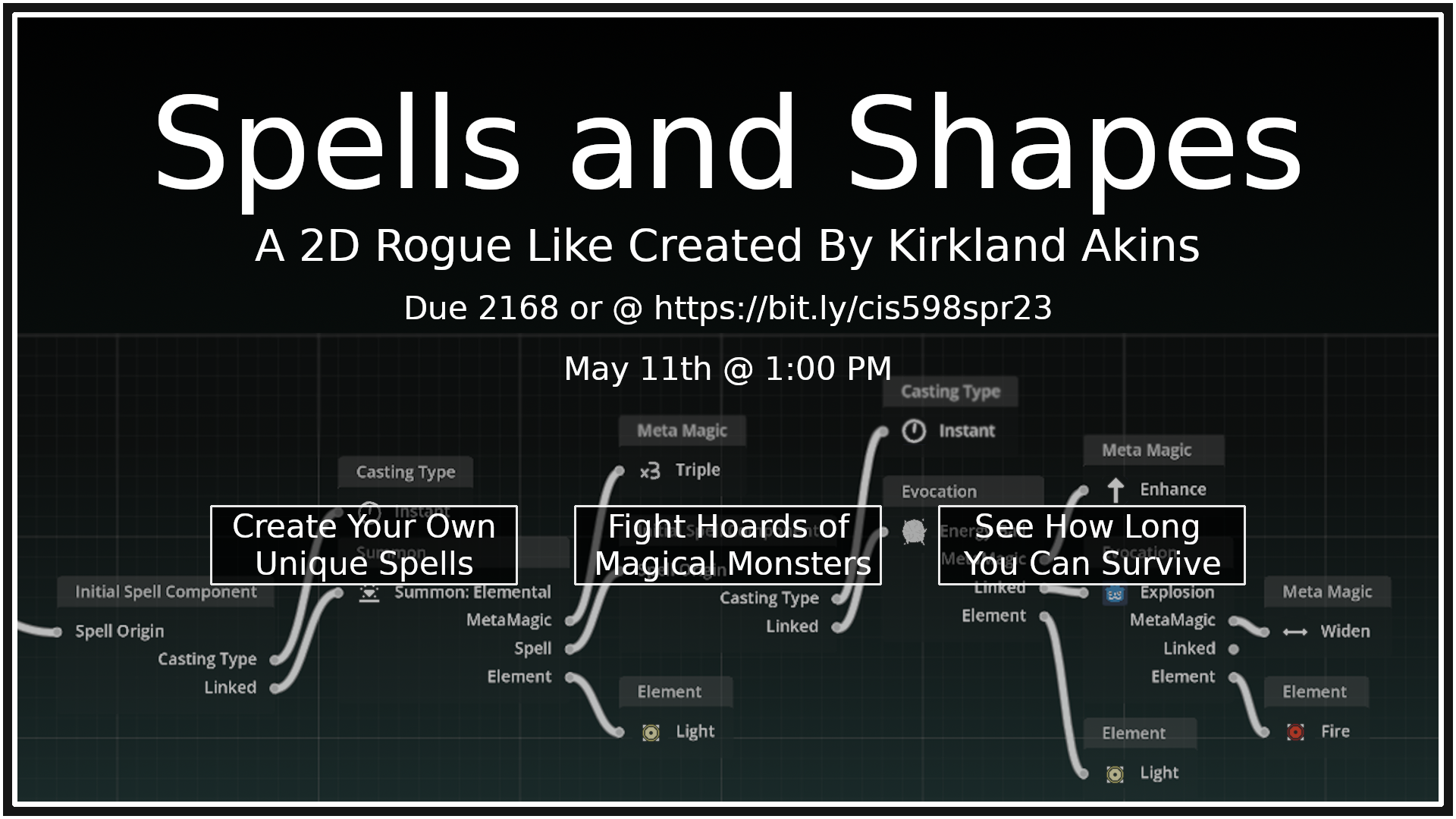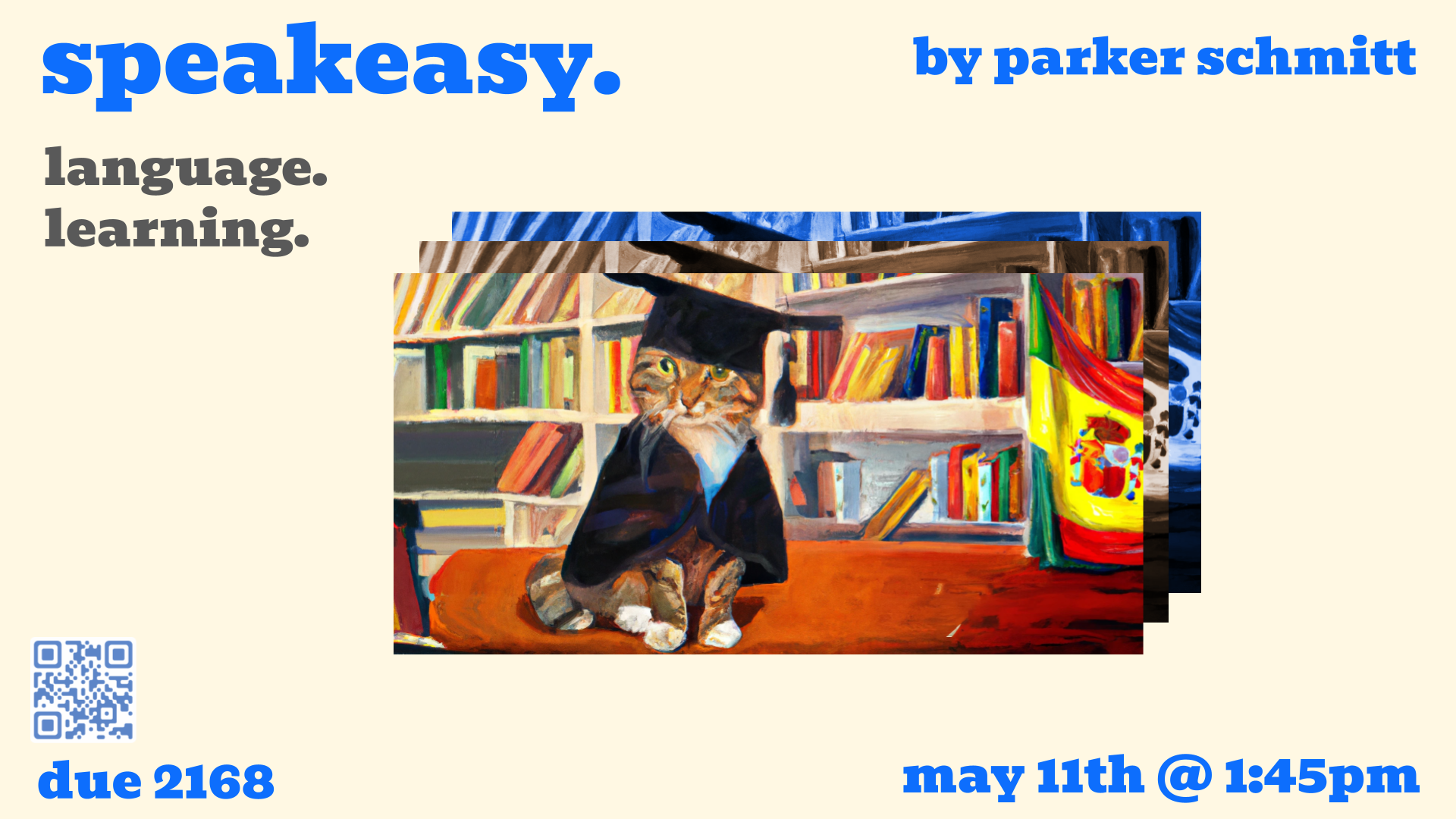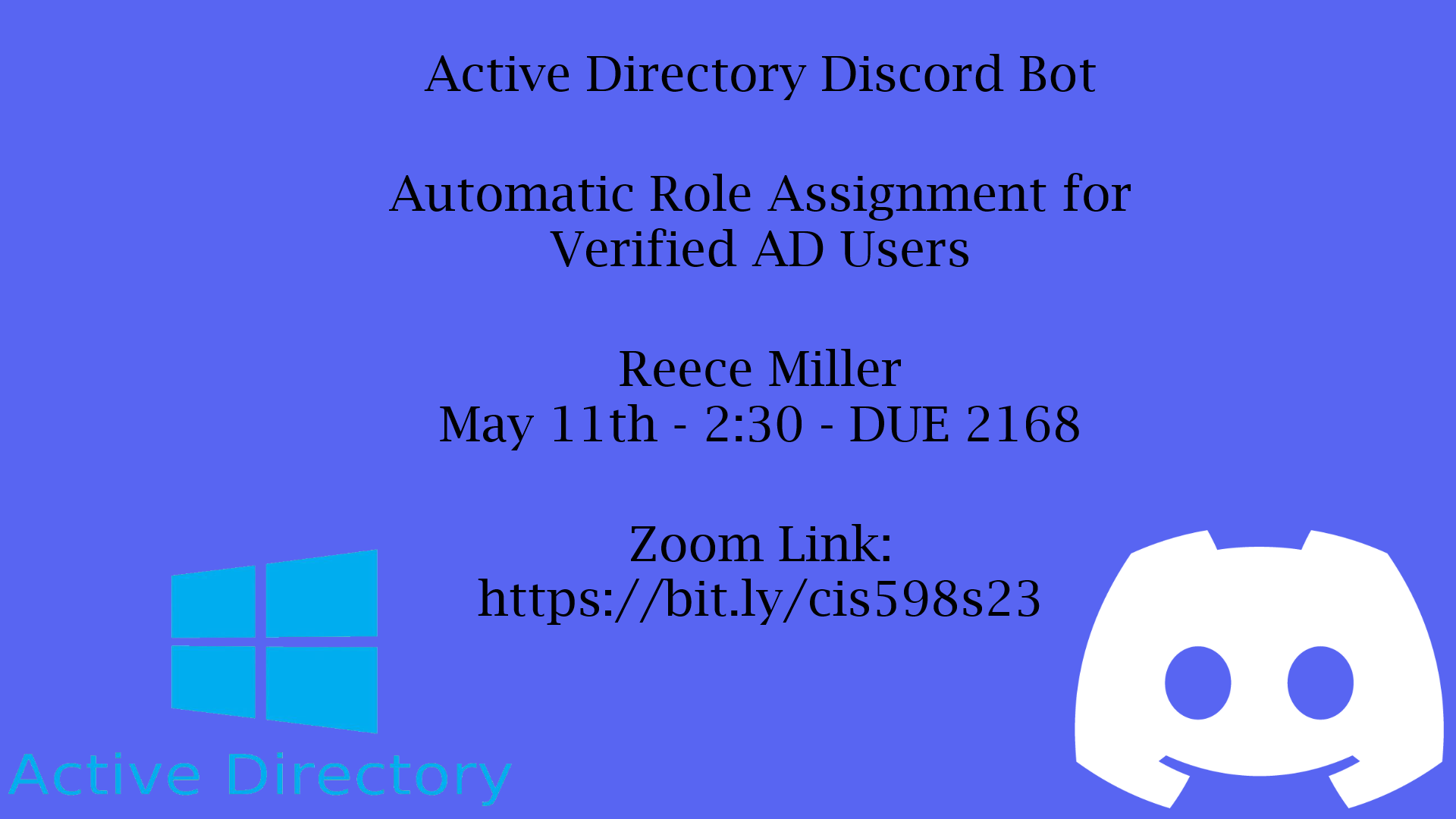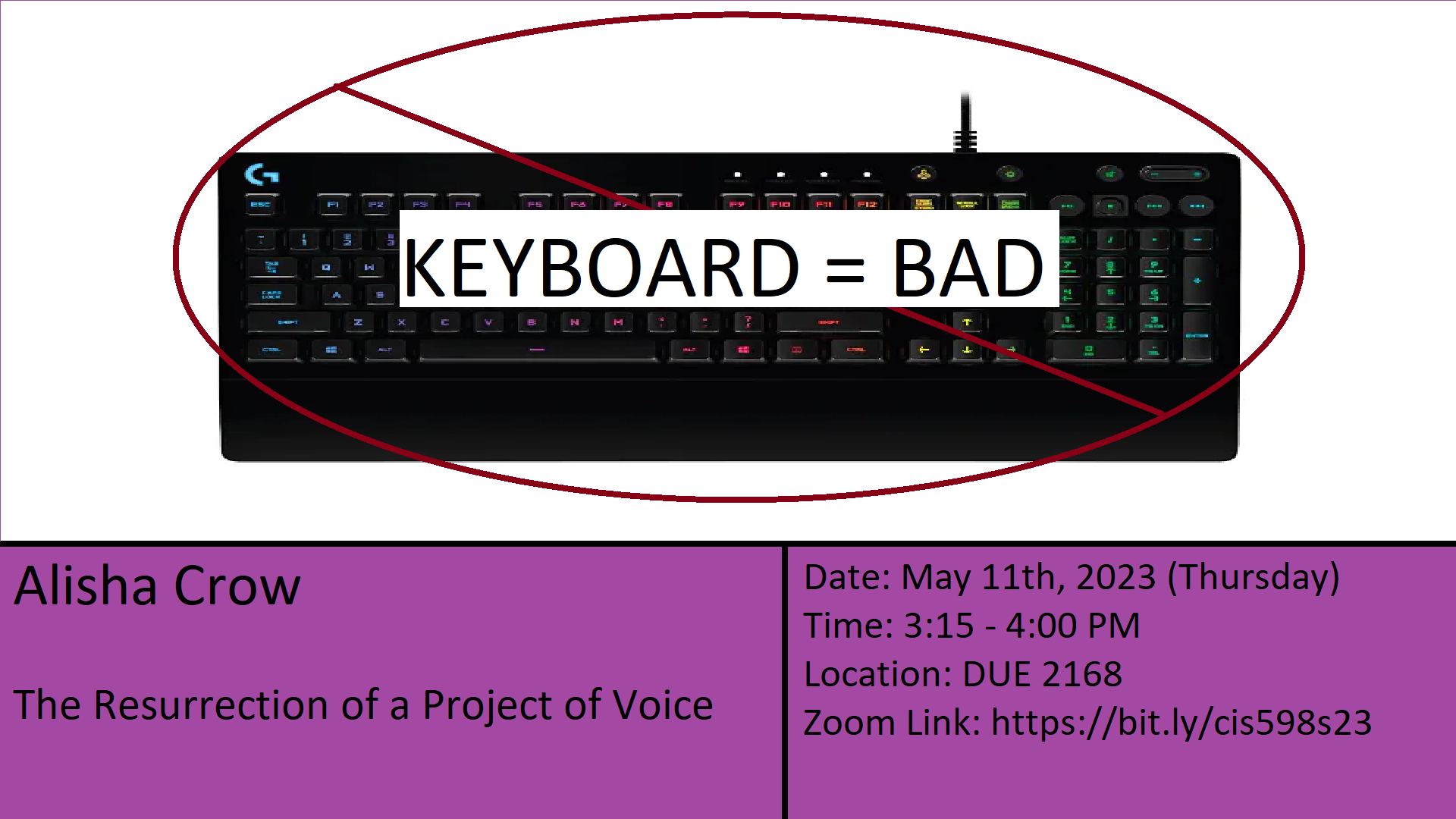Spring 2023
All presentations will be streamed on Zoom at https://bit.ly/cis598s23
| Project | Student | Advisor | Date | Time | Location |
|---|---|---|---|---|---|
| Where to Look - Cyber Sensor Placement and Calibration | Chase Barber Kale DeYoung Kaleb Ernst Nathan Fleming Nathan Wells | Vasserman | Mon., May 1, 2023 | 1:00 - 2:00 | DUE 2168 |
| Hydroponics Management System | Cashel FitzGibbons | Neilsen | Tues., May 9, 2023 | 8:00 - 8:45 | DUE 2168 |
| Day to Remember | Eve Steinle | Bean | Tues., May 9, 2023 | 8:45 - 9:30 | DUE 2168 |
| SharePoint Resource Management Tool | John Velasco | Feldhausen | Tues., May 9, 2023 | 9:30 - 10:15 | DUE 2168 |
| ClarifAI | Patrick Moll | Thornton | Tues., May 9, 2023 | 10:15 - 11:00 | DUE 2168 |
| SongSwap | Jared Bothwell | Feldhausen | Tues., May 9, 2023 | 11:00 - 11:45 | DUE 2168 |
| EasyCart | Connor Wiggins | Thornton | Tues., May 9, 2023 | 11:45 - 12:30 | DUE 2168 |
| Improviso | Cody Murphy | Weese | Tues., May 9, 2023 | 1:15 - 2:00 | DUE 2168 |
| 3D Printing Monitor Framework | Quentin Ricketts | Neilsen | Tues., May 9, 2023 | 2:00 - 2:45 | DUE 2168 |
| Team Based Pixel Game | Sean Hurt | Feldhausen | Tues., May 9, 2023 | 2:45 - 3:30 | DUE 2168 |
| Magical Casters | Jordan Miller | Hsu | Tues., May 9, 2023 | 5:00 - 5:45 | DUE 2168 |
| Web of Smithies | Eric Yu | Shamir | Wed., May 10, 2023 | 8:00 - 8:45 | DUE 2168 |
| Predictive Golf Tournament Model | Mason Wittman | Shamir | Wed., May 10, 2023 | 8:45 - 9:30 | DUE 2168 |
| Worlds Without Number Faction Simulator | Evelyn Gruver | Hsu | Wed., May 10, 2023 | 9:30 - 10:15 | DUE 2168 |
| Interactions Between Nations Through Trade | Rana Chevuru | Shamir | Wed., May 10, 2023 | 10:15 - 11:00 | DUE 2168 |
| NexdMovie | Parker Billinger | Hsu | Wed., May 10, 2023 | 11:00 - 11:45 | DUE 2168 |
| Quictionary | Marco Vasquez | Valenzuela | Wed., May 10, 2023 | 11:45 - 12:30 | DUE 2168 |
| Realistic Biome Generator | Sam McAnany | Valenzuela | Wed., May 10, 2023 | 1:15 - 2:00 | DUE 2168 |
| ViShader | Eric Honas | Bean | Wed., May 10, 2023 | 2:00 - 2:45 | DUE 2168 |
| Dou Dizhu | Ziyu Zhao | Bean | Wed., May 10, 2023 | 2:45 - 3:30 | DUE 2168 |
| FrontPage | Ethan Hulen | Bean | Wed., May 10, 2023 | 3:30 - 4:15 | DUE 2168 |
| Geoplay | Kaden O’Hare | Weese | Wed., May 10, 2023 | 4:15 - 5:00 | DUE 2168 |
| Climate-Control and Data Logging System for Mycelium Growing | Isaac Peterson | Neilsen | Wed., May 10, 2023 | 5:00 - 5:45 | DUE 2168 |
| Dungeon Swing | Micah Roening | Weese | Thur., May 11, 2023 | 8:00 - 8:45 | DUE 2168 |
| What’s Next | Connor Gabrielson | McGinty | Thur., May 11, 2023 | 8:45 - 9:30 | DUE 2168 |
| Legion DB | Nicholas Friesen | Caragea | Thur., May 11, 2023 | 9:30 - 10:15 | DUE 2168 |
| Analyses of Institutional Reputation through Social Media Data Mining | Adam Clement | Caragea | Thur., May 11, 2023 | 10:15 - 11:00 | DUE 2168 |
| Personal Financial Planning Assistant | Garrett Heitmann | Thornton | Thur., May 11, 2023 | 11:00 - 11:45 | DUE 2168 |
| ELA Platform | Colton Capps | Feldhausen | Thur., May 11, 2023 | 11:45 - 12:30 | DUE 2168 |
| Spells and Shapes | Kirkland Akins | Bean | Thur., May 11, 2023 | 1:00 - 1:45 | DUE 2168 |
| Speakeasy | Parker Schmitt | Feldhausen | Thur., May 11, 2023 | 1:45 - 2:30 | DUE 2168 |
| AD Discord Bot | Reece Miller | Feldhausen | Thur., May 11, 2023 | 2:30 - 3:15 | DUE 2168 |
| The Resurrection of A Project of Voice | Alisha Crow | Weese | Thur., May 11, 2023 | 3:15 - 4:00 | DUE 2168 |
| Pass Keeper | Tucker Deaton | Feldhausen | Fri., May 12, 2023 | 12:00 - 12:45 | DUE 2168 |
Where to Look - Cyber Sensor Placement and Calibration
Chase Barber
Kale DeYoung
Kaleb Ernst
Nathan Fleming
Nathan Wells
Data Processing Units (DPU) are a cutting edge technology developed by NVIDIA in the efforts of offloading computation that could be done by the processor. Our team has been working to recreate the experiment “GraphBLAS on the Edge: Anonymized High Performance Streaming of Network Traffic”. The idea being that instead of using high thread count central processing units (CPU) a DPU could be used to either create similar results or even increase performance. The implementation of this project was achieved with libraries such as Data Plane Development Kit (DPDK) and GraphBLAS and written in C.
Hydroponics Management System
Cashel FitzGibbons
Cashel FitzGibbons’s Computer Science Project, a Hydroponic Management System, will be presented at 8 a.m. on Tuesday, May 9th, 2023. The presentation will be held in DUE 2168 and streamed on Zoom at https://bit.ly/cis598s23. Hydroponics is a horticultural practice that allows for growing plants without soil by submerging the roots in a nutrient rich aqueous solution. The benefits of this include more control over the plants’ development, greater planting-density via verticality, and no dependence on soil quality. This project presents an easily expandable technological solution that can manage the overhead of monitoring and regulating the environment of a hydroponic system and allow the grower to easily access and control the system via a website. The development stack for such a system must include sensors, actuators, microcontrollers, small single-board computers, a database management server, a web server, and a corresponding user-friendly website. The Hydroponic Management System proposed in this project will utilize Arduino Nanos, to control relevant sensors and actuators, that connects via Bluetooth to a Raspberry Pi, to allow future controllers to be easily added, which inserts the data into a MSSQL Server database bound to a website developed using ASP.NET Razor and MVVM architecture hosted on a ASP.NET webserver. The MSSQL Server and Webserver are hosted locally via Docker.
Day to Remember
Eve Steinle
Day to Remember is a React application that allows couples to plan their wedding day. Inspired by The Knot and Zola, Day to Remember allows couples to keep all their wedding information in one central location. Features include picking a venue, tracking wedding expenses and to dos, coming up with a color palette and generating seating charts for guests. All data is stored in Firebase for quick and easy retrieval and insertion. Presented by Eve Steinle on May 9th at 8:45 am in DUE 2168. Zoom link: https://bit.ly/cis598s23.
SharePoint Resource Management Tool
John Velasco
Improving an employee’s accessibility to resources is vital to improving their productivity. This SharePoint tool allows organizations to provision pages to easily access resources specific to a certain position. Employees can utilize simple customization features improved from the standard SharePoint experience, reinforcing the ease-of-use experience. Software architecture is maintained by the .NET Framework and open source libraries that allow interaction with Microsoft 365 products.
ClarifAI
Patrick Moll
ClarifAI is an iOS Application that utilizes ChatGPT to give users personalized answers to their questions. It also provides data-rich ways to view and share chats. Users can adjust the length and/or complexity of responses given to them from ChatGPT. Intuitive Symbols provide an easy way to distinguish the complexity of a chat or a message. It is built with SwiftUI, OpenAI API, and CoreData.
SongSwap
Jared Bothwell
SongSwap is a mobile application designed to simplify sharing and discovering music with friends. Primarily inspired by BeReal and Spotify Wrapped, SongSwap allows users to share their authentic music taste. The app allows users to connect their Spotify accounts and share their last played song each day. SongSwap allows users to get a better understanding of songs that their friends actually listen to and also help them find new music. Users can view a main feed of all their friends recent posts or a separate Discover page that includes top songs posted by any user. The app’s tech stack includes TypeScript, React Native, Expo, Firebase, and the Spotify Web API.
EasyCart
Connor Wiggins
My project, EasyCart, is a Chrome extension designed to enhance the online shopping experience for individuals with visual impairments by streamlining essential e-commerce tasks. Leveraging JavaScript, HTML/CSS, and Webpack, the extension introduces a user-friendly menu at the top of webpages that centralizes key functionalities, including adding products to the cart, clearing the cart, and navigating to the account address and payment pages. This solution aims to make e-commerce more accessible and efficient for visually impaired users, empowering them to independently manage their online purchases.
Improviso
Cody Murphy
Discover Improviso, an iOS app designed to transform travel itinerary planning by prioritizing flexible exploration within cities and regions, rather than adhering to rigid time-based schedules that can often lead to anxiety for travelers who prefer spontaneity. Inspired by the Portuguese word for “improvise” or “impromptu,” Improviso lets users effortlessly and intuitively plan potential experiences, while the app’s dashboard dynamically displays destination options like dining, museums, and parks. Offering an extra layer of planning without becoming entangled in exact scheduling, Improviso employs recommendation algorithms to guide users towards unexplored experiences by taking into account information such as user proximity / transit times and chosen interest ratings to prioritize where to go next. Improviso is developed using SwiftUI and harnesses the power of Core Data for secure user information storage, while leveraging Apple’s MapKit for routing and location data, providing a seamless and personalized exploration experience. The developer and presenter is Cody Murphy and the presentation will be held in DUE 2168 on May 9th at 1:15 PM. Zoom: https://bit.ly/cis598s23
3D Printing Monitoring Framework
Quentin Ricketts
The “3D Printing Monitoring Framework” is a Python-based software framework that automatically monitors 3D printing processes using webcam images. The program uses computer vision techniques to analyze the images and detect issues such as print detachment or lack of extrusion. The framework is currently configured to use a Prusa I3 Mk3 printer and pre-sliced gcode. To use the framework, the user is prompted to connect the webcam and printer through serial communication, load in a gcode file, and press start. From there, the program runs autonomously until the part is printed, at which point the program logs the results. The program is designed to run locally on a user’s computer and is relatively lightweight. The program is designed as a framework, meant to be expanded in the future, introducing new features, and adding broader support for printers and webcams.
Team Based Pixel Game
Sean Hurt
Warpix is a team-based pixel game with time limited moves. Inspired by r/place, a digital canvas where users collaborate to create art one pixel at a time, Warpix involves two teams of players who must coordinate single-pixel moves to play effectively. Users can login using Google Authentication to begin making moves and will have to wait a set amount of time before making another move. Warpix is a responsive website built using a Node.js backend with a React frontend connected using WebSockets.
Magical Casters
Jordan Miller
Ways to control things that happen within video games have been the same for a while, in my opinion. Magical Casters is a game that looks to fix that, by using a Neural Network (Keras/TensorFlow) to observe mouse movements in the form of a drawing and classify it. In a randomly generated 2D Voxel-based world built in Monogame and filled with fearsome foes and life-changing loot, having a certain stick and drawing magical circles allows even the most average caster to create magnificent fireballs or whatever they may please, with respect to what they have learned. The foes you may encounter can be the harmless-looking slime or the large and slow but powerful golem. Hidden among these enemies, however, you will find bountiful rewards for whoever is brave enough to take the journey.
Web of Smithies
Eric Yu
The Maitland E. Smith Scholarship House is an off-campus cooperative living option for all K-State male students. The house was established back in 1958 and currently consists of 34 members. Over the years, it’s apparent that the house is failing to keep up with the fast pace of the technological advancements the world is going through nowadays, and one of the root problems is our outdated website. Web of Smithies is an upgraded website built with React JS on the front-end and Cypher on the back end. It is a collection of microservices and is designed to help with three main aspects of the house: informativity, connectivity, and creativity. With this tool, people who aren’t familiar with the house can be informed, the recruiting process will become much easier, and current smithies (house members) will have the opportunity to connect with each other, incoming new-men, and alumnus better. Overall, Web of Smithies will increase the life quality of everyone associated with Smith House and help show the world just how exciting cooperative living can be.
Predictive Golf Tournament Model
Mason Wittman
Golf tournaments are extremely hard to predict as there are 156 players in one tournament and any of them have a chance to win. The Golf Tournament Prediction Model will be able to output six potential players that have a good chance of winning based off how the player’s strengths and the course’s strengths align. Many courses are tailored better to some players’ game as each individual course has certain aspects that differ from other courses. The model uses machine learning software Weka to help create a working algorithm. Come support Mason Wittman on Wednesday May 10, 2023, at 8:45AM – 9:30AM in DUE 2168 or at https://bit.ly/cis598s23.
Worlds Without Number Faction Simulator
Evelyn Gruver
The Worlds Without Number Faction Simulator is an application developed by Evelyn Gruver. Worlds Without Number, its namesake, is a tabletop RPG written by Kevin Crawford. An optional game mechanic is a faction simulator designed to generate events that occur in the world of the campaign a Game Master (GM) is running. This faction simulator from the game rules is a strategy game that the GM runs entirely themselves before engaging with players to dynamically alter the world around them. The simulator is an incredibly useful tool; however, it can be cumbersome to use for large factions with many assets. The Worlds Without Number Faction Simulator aims to remedy this issue with WPF, SSMS, and C# by running the process for the GM as an application so the GM doesn’t have to make the dice rolls themselves. The presentation is Wednesday, May 10 at 9:30 in DUE 2168, or can be viewed on Zoom here: https://bit.ly/cis598s23
Interactions Between Nations Through Trade
Rana Chevuru
Trying to understand the geopolitics among the different nations is quite challenging. We need serval different tools to understand this topic. Therefore, a tool can be showing that trade between nations can be exponential in understanding geopolitics. A way to show trade between nations is by creating a browser dashboard through Flask and Plotly, properly named interactions between nations through trade. The presentation will be held on May 10 at 10;15 am in Durland 2168.
NexdMovie
Parker Billinger
NexdMovie is a movie recommendation system created by Parker Billinger that develops movie recommendations based on a user’s personal Letterboxd.com ratings. This project was created with a ReactJS front end website for user input, and a Django python backend to complete the scraping and recommendation algorithm. If you are looking for new movies to watch, or just interested in learning more about the project stop by May 10th at 11:00 am in DUE 2168. Can also watch on zoom with the link: https://bit.ly/cis598spr23
Quictionary
Marco Vasquez
Quictionary is a powerful flashcard study tool and a multilingual dictionary combined into one application to allow for quick and easy studying. Quictionary uses a spaced repetition algorithm to assign users daily review sessions. The users can also create study lists to personalize their reviews. This application is meant to act as a companion app to allow language learners to engage with many types of content in their target language while pulling words and phrases to study in Quictionary. This application is being developed for iOS using SwiftUI and Core Data. Join Marco Vasquez on May 10, 2023, at 11:45 PM for a presentation detailing the development and features of Quictionary. In person: DUE 2168 Virtual: https://bit.ly/cis598s23
Realistic Biome Generator
Sam McAnany
Realistic Biome Generator is a plugin for Unreal Engine 5. The plugin generates natural and multi-biome terrain using C++ and the libraries FastNoiseLite and RealtimeMeshComponent. The process involves creating the initial terrain using noise, calculating the different climates of the landscape, and then determining the biomes based on calculated annual precipitation and average temperature. Once the biomes have been computed, it will automatically create the terrain mesh and apply the specified ground materials for each biome type. This project will enable users to rapidly produce more immersive game environments and bring greater realism to their games. This project will be presented by Sam McAnany at 1:15 - 2:00 PM on Wednesday, May 10, 2023, in DUE 2168 or on Zoom at https://bit.ly/cis598spr23.
ViShader
Eric Honas
ViShader is a graph-based editor for visually creating HLSL shaders. In contrast to similar graph-based shader editors like Unity’s Shader Graph, ViShader is not tied to a game engine but rather operates as a standalone application. Additionally, ViShader produces 2D fragment shaders making it suitable for game frameworks like MonoGame where no graph-based shader editors currently exist. ViShader was developed using C#, Windows Presentation Foundation, .NET 6.0, the MVVM Toolkit, and the open-source library Nodify. Eric Honas will be presenting ViShader at 2:00pm - 2:45pm on Wednesday, May 10, in DUE 2168. The presentation will also be available on Zoom using the link https://bit.ly/cis598s23.
Dou Dizhu
Ziyu Zhao
Dou dizhu is an online web multiplayer card game, which is a popular poker game in China. Using React and CSS to build the client and setup a Node.js server with Express framework. Configuring Socket.io on the server and client-side to relay gameplay. The game is played by three players with a deck of 54 cards. One of the player is the landlord and the other two are farmers. The two sides fight, and the one who finishes the cards first wins. The core gameplay mechanic revolves around comparing card categories. In general, players can only outdo the previously played card category if they possess a card or set of cards of the same category and length, but with a higher rank. If no other player can beat the current category, the player who played the unbeatable category is allowed to choose a new category to continue the game.
FrontPage
Ethan Hulen
This new web app works by presenting users with a list of news sources to choose from upon signing up for an account, then using NewsAPI to retrieve articles from those sources. After clicking on enough articles, the user will be able to obtain recommendations for other articles that are related to the ones that they clicked on before.
Geoplay
Kaden O’Hare
Hello, my name is Kaden O’Hare and my senior project is called GeoPlay. GeoPlay is a website designed to help you create playlists for Spotify based on what you listen to where by logging the music you’ve listened to recently and getting your location. It uses C#, HTML, and SQL mainly, as well as various APIs such as Spotify Web and HTML Geolocation. I present on Wednesday, May 10th in DUE 2168 as well as on Zoom at https://bit.ly/cis598s23.
Climate-Control and Data Logging System for Mycelium Growing
Isaac Peterson
Mushroom cultivation is growing, both as a hobby and a small business opportunity. Grain spawn is a nutrient-dense food source fully colonized and free from contamination. It is used to inoculate a larger substrate, like straw or sawdust, giving the desired fungus a head start against any competing decomposers. Because producing it can be slow and tedious, it is often expensive. I designed a device that makes grain spawn production easier and quicker. The project runs on a raspberry pi zero SBC. The sensor and control code is written in rust. Data is logged in a SQLite database. Freecad was used to model all mechanical parts, and python was used to automate part of that process. Data will accessable by exporting a csv of log files.
Dungeon Swing
Micah Roening
Dungeon Swing is the proof of concept for a top-down 2D hack & slash with a focus on complex player enemy interactions. The final product for this semester focuses on a short fight between the player character and a single enemy. The enemy AI is able to parse player intent and respond appropriately, making for a complex fight against an intelligent (but fair) opponent. Created by Micah Roening, the project will be presented on Thursday May 11th from 8:00 a.m. to 8:45 a.m. in DUE 2168. Additionally, the presentation will be streamed at the following Zoom link: https://bit.ly/cis598spr23
What’s Next
Connor Gabrielson
What’s Next is a web application designed to aid users in finding new music to listen to, as well as play on guitar. The application was built using a Django backend and a React frontend. There are three main pieces of functionality used in the application: a dashboard showing basic statistics about the current logged in user’s Spotify listening habits, a page to find new music to listen to, and a page for a user to find music to play on guitar. The application uses data from the Spotify API for user statistics, as well as to obtain the audio features of songs - the basis of the recommendation system. In addition to this, the application uses web scraped tablature from guitar tab websites to recommend songs to recommend songs that a user will both want to learn, and can reasonably learn.
Legion DB
Nicholas Friesen
With the advent of modern data systems for web development, SQL server is being complemented by many NoSQL solutions which are better suited for web APIs like REST and SOAP. While there are many database applications for NoSQL and big data, many companies still struggle finding a way to store and operate with data from 3rd party API’s. Legion DB is a database engine designed to store both JSON and XML, the two most popular API return types. This would allow companies to easily store data for future use in the format it originally was produced in with very little effort. The engine has many performance features to improve query performance over simply storing raw files and adds important meta information automatically to assist developers in creating useful data platform features.
Analyses of Institutional Reputation through Social Media Data Mining
Adam Clement
Hello everyone, my name is Adam Clement and my senior project is titled Analyses of Institutional Reputation through Social Media Data. My project consisted of collecting and analyzing data related to Kansas State University from three social media; Reddit, Facebook, and Twitter. With my analysis I hope to provide the Office of Institutional Research and Assessment valuable data so they can perform better marketing and recruiting strategies. Included in my analysis, I also looked at social media data from our Big 12 competitors to see how our social media prescence stacked up against our peers. I used four main types of analysis in my research; sentiment, topic, engagement, and competitive analysis. If you would like to see what my research found, you can attend my presentation on Thursday, May 11th at 10:15am in DUE 2168 or via Zoom at the following link https://us05web.zoom.us/j/89605150278?pwd=RVRKRDlIT3JweFRoUmJ3QmQybzVLUT09
Personal Financial Planning Assistant
Garrett Heitmann
The Personal Financial Planning Assistant is a project focused on offering the storage of financial information and using that information to calculate common personal finance equations. Towards this the application is run in the Visual studio IDE utilizing the Windows forms application preset and Microsoft’s EntityFrameworkCore.Sqlite. Using these tools the application Gui allows the user to add all financial transactions into a local database file sorted into different types of revenue and income. Using these Records the user can calculate personal financial planning equations with little input and display the results in visual forms. This allows the user to have a better visual understanding of their financial desires and situation.
ELA Platform
Colton Capps
An ELA is an equivalent learning activity. Activities are equivalent if they teach the same concept and provide a similar level of scaffolding/support to the student. ELAs can enable teachers to adhere to a concept called Mastery Learning, which is a method of curriculum delivery shown to be effective, but not present in many classrooms. ELAs can also enable the Universal Design for Learning (UDL), another set of researched concepts involving optimal circumstances for learners. The ELA Platform is a webapp which integrates existing ELAs with an LMS via the IMS LTI standard. By fusing these standardized learning technologies and concepts (Mastery, Equivalency, UDL, LTI, LMS), the ELA Platform can improve learning strategies across many classrooms.
Spells and Shapes
Kirkland Akins
Spells and Shapes is a minimalistic 2D rouge like game that was created using the Godot Engine. In the game the player progresses through a series of procedurally generated encounters using a repertoire of player made magic spells to combat enemies that stand in their way. Completing encounters rewards the player with “Spell Components”, which are used to create and modify what spells they have available to them. Both the player and the enemies they face get access to more and stronger Spell Components as the game progresses, allowing the spells they use to become more varied and numerous. The modular design and random acquisition of Spell Components ensures that each attempt is different than the last, and forces players to adapt what spells they use as they progress.
Speakeasy
Parker Schmitt
Speakeasy is a language learning tool designed for users who want to master a new language. It offers a bare-bones approach to language learning that includes memorization exercises for a language’s most common vocabulary terms, using a spaced memorization learning algorithm. It is built using React and Typescript.
AD Discord Bot
Reece Miller
My name is Reece Miller, and my presentation will provide an in-depth overview of my Active Directory Discord Bot. Over the last few years, the online VoIP and social platform Discord has proven to be a versatile tool in both education and in the workplace. Within a Discord server, administrator privileges and permissions are organized with a hierarchical “role” system; users can be given roles on the server that grant them elevated permissions which dictate what they can and cannot see. The Active Directory Discord Bot uses the Discord.js library and the Gmail API to sync these roles with the groups that a user belongs to within a Windows Active Directory through a simple email verification process. To become “AD Verified” and access previously locked elements of the Discord server, a user must provide their email address and then verify their identity with a v4 UUID that is sent to that address. My presentation will take place on Thursday, May 11th from 2:30-3:15 in DUE 2168. A link to the Zoom stream can be found at https://bit.ly/cis598s23
The Resurrection of A Project of Voice
Alisha Crow
My name is Alisha Crow, and my senior project is called The Resurrection of A Project of Voice. My project is a Python-based program that uses speech-to-text to do various computer functions, such as Opening/Closing apps, switching between applications, pressing keys, and typing words. This program is meant to make using a computer more accessible to people who have handicaps that impair them. My final presentation will take place on May 11, 2023 (Thursday) in DUE 2168. For those interested in my project The Zoom link is https://bit.ly/cis598s23
Pass Keeper
Tucker Deaton
Nowadays most social media platforms, businesses and apps require users to create accounts with usernames and passwords. I have found that keeping track of the various passwords results in confusion, annoyance, and time devoted to creating new passwords each time the user forgets theirs. These challenges are why I have created the Pass Keeper website to keep track of the many passwords each of us utilize on a daily basis. Please join me; Tucker Deaton, in DUE 2168 or by zoom at https://bit.ly/cis598s23 to hear more about my website Pass Keeper!
